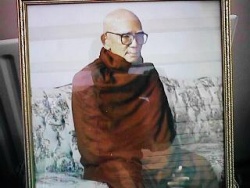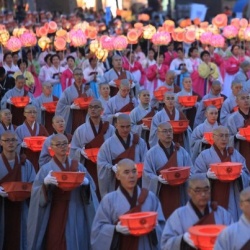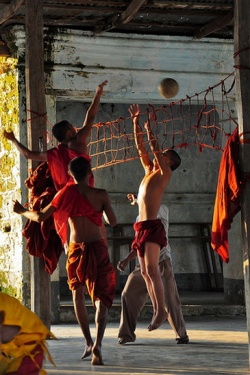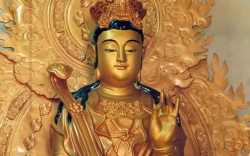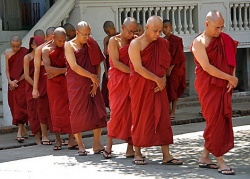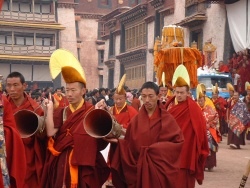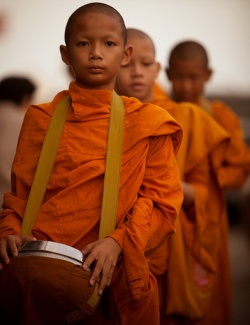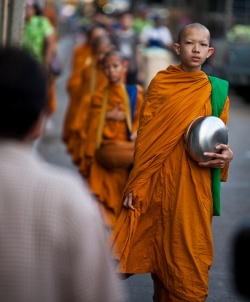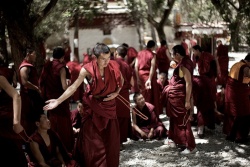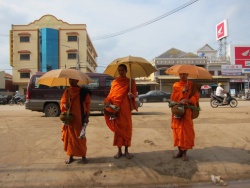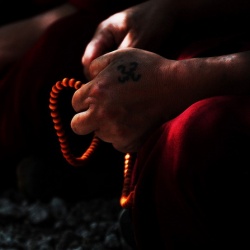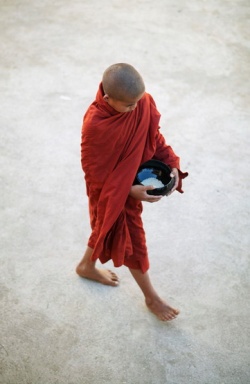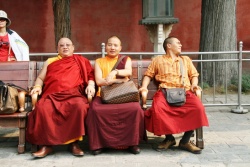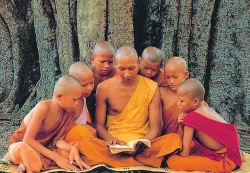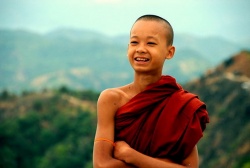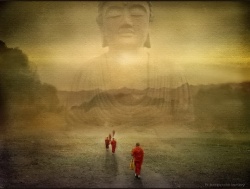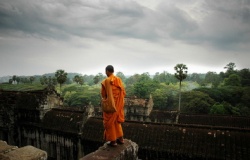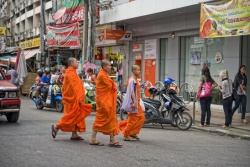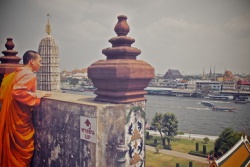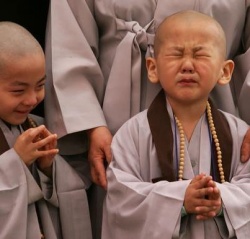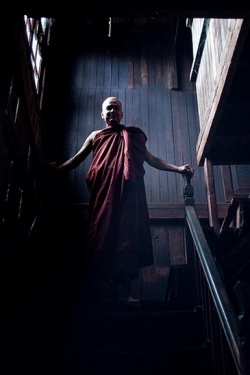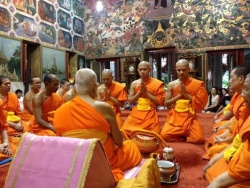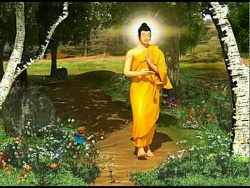Difference between revisions of "Sasana"
| Line 3: | Line 3: | ||
PREFACE TO THE DULLABHA [[SASANA]] | PREFACE TO THE DULLABHA [[SASANA]] | ||
[[File:4312886 n.jpg|thumb|250px|]] | [[File:4312886 n.jpg|thumb|250px|]] | ||
| − | Nowadays the [[Buddha's Teaching]] is gradually spreading to every corner of the [[world]]. The [[people]] of the [[world]], especially in the {{Wiki|Western}} Hemisphere, {{Wiki|being}} desirous of [[spiritual]] [[food]], are demanding such [[food]] as will satisfy their need, which, in the case of very many, has been starving of anything comparable to the sustaining {{Wiki|nature}} and {{Wiki|taste}} of the [[Dhamma]]. For long they have been satiated with an unsavoury and fanciful [[mental]] [[diet]] of divers cults and "isms", interspersed, over the course of [[time]], with the gradual introduction of various types of {{Wiki|Oriental}} {{Wiki|psychology}} or [[philosophy]] bearing different labels. It is from amongst this background that [[Buddhism]] has thus come into [[contact]] with the {{Wiki|Western}} [[mind]], not suddenly but slowly, due to its profundity in depth of [[character]] and its differing approaches, both {{Wiki|theoretical}} and practical. | + | Nowadays the [[Buddha's Teaching]] is gradually spreading to every corner of the [[world]]. The [[people]] of the [[world]], especially in the {{Wiki|Western}} Hemisphere, {{Wiki|being}} desirous of [[spiritual]] [[food]], are demanding such [[food]] as will satisfy their need, which, in the case of very many, has been starving of anything comparable to the sustaining {{Wiki|nature}} and {{Wiki|taste}} of the [[Dhamma]]. For long they have been satiated with an unsavoury and fanciful [[mental]] [[diet]] of divers {{Wiki|cults}} and "isms", interspersed, over the course of [[time]], with the [[gradual]] introduction of various types of {{Wiki|Oriental}} {{Wiki|psychology}} or [[philosophy]] bearing different labels. It is from amongst this background that [[Buddhism]] has [[thus come]] into [[contact]] with the {{Wiki|Western}} [[mind]], not suddenly but slowly, due to its profundity in depth of [[character]] and its differing approaches, both {{Wiki|theoretical}} and {{Wiki|practical}}. |
[[File:4396790839.jpg|thumb|250px|]] | [[File:4396790839.jpg|thumb|250px|]] | ||
| − | As [[time]] has passed by, many Westerners have accepted [[Buddhism]], have become [[Buddhists]] and put the [[Teaching]] into practical use. Some of them, not satisfied with ordinary lay [[life]], which is surrounded so much by [[worldly]] affairs that they could not properly observe the strict [[Buddhist]] way of undertaking, have gone forth from home to homelessness and became [[monks]]. At such a juncture it falls to {{Wiki|Asian}} [[Buddhists]], both lay and [[monk]], to offer guidance. | + | As [[time]] has passed by, many Westerners have accepted [[Buddhism]], have become [[Buddhists]] and put the [[Teaching]] into {{Wiki|practical}} use. Some of them, not satisfied with ordinary lay [[life]], which is surrounded so much by [[worldly]] affairs that they could not properly observe the strict [[Buddhist]] way of {{Wiki|undertaking}}, have gone forth from home to homelessness and became [[monks]]. At such a juncture it falls to {{Wiki|Asian}} [[Buddhists]], both lay and [[monk]], to offer guidance. |
[[File:440x900.jpg|thumb|250px|]] | [[File:440x900.jpg|thumb|250px|]] | ||
| − | Unfortunately, however, some of those so-called [[Buddhists]] have failed in their [[duty]], especially when dealing with the higher stage of the [[Buddha]] [[Sasana]]. Due to lack of proper [[knowledge]], as to the genuine [[essence]] of it, they have made mistakes, confusing secular habitual customs and [[traditions]] with [[essential]] points in the [[Dhamma]]. Sometimes their [[attitude]] towards the [[Dhamma]] has come to be seen as unscrupulous and unintellectual, in some cases even bordering on that of {{Wiki|being}} entertainment. It shows, therefore, that they have taken their own [[initiation]] into novicehood and [[monkhood]] very casually, and without due regard to the consequences of betraying their calling. | + | Unfortunately, however, some of those so-called [[Buddhists]] have failed in their [[duty]], especially when dealing with the higher stage of the [[Buddha]] [[Sasana]]. Due to lack of proper [[knowledge]], as to the genuine [[essence]] of it, they have made mistakes, confusing {{Wiki|secular}} habitual customs and [[traditions]] with [[essential]] points in the [[Dhamma]]. Sometimes their [[attitude]] towards the [[Dhamma]] has come to be seen as unscrupulous and unintellectual, in some cases even bordering on that of {{Wiki|being}} {{Wiki|entertainment}}. It shows, therefore, that they have taken their [[own]] [[initiation]] into novicehood and [[monkhood]] very casually, and without due regard to the {{Wiki|consequences}} of betraying their calling. |
[[File:45monk.jpg|thumb|250px|]] | [[File:45monk.jpg|thumb|250px|]] | ||
| − | It is in [[order]] to draw [[attention]] tot this corrupt state of affairs that the author has written this booklet. | + | It is in [[order]] to draw [[attention]] tot this corrupt [[state]] of affairs that the author has written this booklet. |
[[File:465841g.JPG|thumb|250px|]] | [[File:465841g.JPG|thumb|250px|]] | ||
INTRODUCTION | INTRODUCTION | ||
| Line 17: | Line 17: | ||
The [[Buddha's teaching]] or admonition is called [[sasana]]. The words indicative of it, namely the Triple [[Basket]], are also called [[sasana]] which is termed in [[Pali]] Pariyattisaddhamma (the system of Dhamma-learning). | The [[Buddha's teaching]] or admonition is called [[sasana]]. The words indicative of it, namely the Triple [[Basket]], are also called [[sasana]] which is termed in [[Pali]] Pariyattisaddhamma (the system of Dhamma-learning). | ||
[[File:4733378042.jpg|thumb|250px|]] | [[File:4733378042.jpg|thumb|250px|]] | ||
| − | The disciplinary law of conduct for the [[monks and nuns]] who closely follow the admonition of the [[Buddha]], is also called [[sasana]]. In this case the term Dhammavinaya is more preferable to the term [[sasana]]. | + | The disciplinary law of conduct for the [[monks and nuns]] who closely follow the admonition of the [[Buddha]], is also called [[sasana]]. In this case the term [[Dhammavinaya]] is more preferable to the term [[sasana]]. |
[[File:47527monks.jpg|thumb|250px|]] | [[File:47527monks.jpg|thumb|250px|]] | ||
| − | [[Dhamma]] and [[vinaya]] or Dhammavinaya | + | [[Dhamma]] and [[vinaya]] or [[Dhammavinaya]] |
[[File:4798124218.jpg|thumb|250px|]] | [[File:4798124218.jpg|thumb|250px|]] | ||
| − | Generally speaking, [[Dhamma]] concerns the inner [[life]] of [[monks and nuns]] or {{Wiki|conscience}} and outlook of them and also stands for the [[body]] of their [[spiritual]] standards which they are to believe and follow. [[Vinaya]] means the [[discipline]] governing and regulating the outward [[life]] of [[monks and nuns]] who have entered the [[monastic order]]. The combined [[word]] Dhammavinaya means admonition in accordance with [[Dhamma]] or [[righteousness]] and [[discipline]] decreeing a definite standard of outward [[morality]] and comprising the course of training laid down for the proper {{Wiki|behaviour}} of [[monks and nuns]].*(* O [[bhikkhus]], those [[monks]] who are newer comers, who have recently left the home, who have presently come into this Dhammavinaya should be urged, encouraged, and established for development of fourfold application of [[Mindfulness]]." Sam. 3 P 125) It means that by [[observance]] of the course of training, a [[disciple]] of the [[Buddha]] will finally reach the {{Wiki|realisation}} of subjective states and his or her [[proper conduct]] will lead to rejection of [[passion]], [[hatred]], {{Wiki|confusion}} and to the destruction of [[cankers]]. | + | Generally {{Wiki|speaking}}, [[Dhamma]] concerns the inner [[life]] of [[monks and nuns]] or {{Wiki|conscience}} and outlook of them and also stands for the [[body]] of their [[spiritual]] standards which they are to believe and follow. [[Vinaya]] means the [[discipline]] governing and regulating the outward [[life]] of [[monks and nuns]] who have entered the [[monastic order]]. The combined [[word]] [[Dhammavinaya]] means admonition in accordance with [[Dhamma]] or [[righteousness]] and [[discipline]] decreeing a definite standard of outward [[morality]] and comprising the course of {{Wiki|training}} laid down for the proper {{Wiki|behaviour}} of [[monks and nuns]].*(* O [[bhikkhus]], those [[monks]] who are newer comers, who have recently left the home, who have presently come into this [[Dhammavinaya]] should be urged, encouraged, and established for [[development]] of fourfold application of [[Mindfulness]]." Sam. 3 P 125) It means that by [[observance]] of the course of {{Wiki|training}}, a [[disciple]] of the [[Buddha]] will finally reach the {{Wiki|realisation}} of [[subjective]] states and his or her [[proper conduct]] will lead to rejection of [[passion]], [[hatred]], {{Wiki|confusion}} and to the destruction of [[cankers]]. |
[[File:47jh.jpg|thumb|250px|]] | [[File:47jh.jpg|thumb|250px|]] | ||
| − | Brahmacariya, another [[word]] for [[Sasana]] | + | [[Brahmacariya]], another [[word]] for [[Sasana]] |
[[File:48244.jpg|thumb|250px|]] | [[File:48244.jpg|thumb|250px|]] | ||
| − | The [[word]] Brahmacariya ({{Wiki|holy}} [[life]]) very often occurs as a {{Wiki|synonym}} of the [[word]] of [[sasana]] both in the Texts and the Commentaries. {{Wiki|Holy}} [[life]] is inclusive of the three trainings, namely the training of [[supreme]] [[morality]] (Adhisilasikkha), the training of 1. O [[bhikkhus]], those [[monks]] who are newcomers, who have recently left the home, who have presently come into this Dhammavinaya should be urged, encouraged, and established for development of fourfold Application of [[Mindfulness]]. (Sam. 3 P 125) [[supreme]] concentration(Adhicittasikkha) and the training of [[supreme]] wisdom(Adhipannasikkha)*.(* "Or this whole [[Sasana]], comprehensive of all three trainings is (called) {{Wiki|Holy}} [[Life]] as it exceeds all [[lives]]." [[Abhi]]. 2 A pp 312-3 "O Sona, it is difficult to lead a {{Wiki|holy}} [[life]] with a {{Wiki|solitary}} [[sleeping]] place and with one meal a day for all your [[life]]." Vi 3 P 284) | + | The [[word]] [[Brahmacariya]] ({{Wiki|holy}} [[life]]) very often occurs as a {{Wiki|synonym}} of the [[word]] of [[sasana]] both in the Texts and the Commentaries. {{Wiki|Holy}} [[life]] is inclusive of the [[three trainings]], namely the {{Wiki|training}} of [[supreme]] [[morality]] (Adhisilasikkha), the {{Wiki|training}} of 1. O [[bhikkhus]], those [[monks]] who are newcomers, who have recently left the home, who have presently come into this [[Dhammavinaya]] should be urged, encouraged, and established for [[development]] of fourfold Application of [[Mindfulness]]. (Sam. 3 P 125) [[supreme]] concentration(Adhicittasikkha) and the {{Wiki|training}} of [[supreme]] wisdom(Adhipannasikkha)*.(* "Or this whole [[Sasana]], comprehensive of all [[three trainings]] is (called) {{Wiki|Holy}} [[Life]] as it exceeds all [[lives]]." [[Abhi]]. 2 A pp 312-3 "O [[Sona]], it is difficult to lead a {{Wiki|holy}} [[life]] with a {{Wiki|solitary}} [[sleeping]] place and with one meal a day for all your [[life]]." Vi 3 P 284) |
[[File:4831443083 o.jpg|thumb|250px|]] | [[File:4831443083 o.jpg|thumb|250px|]] | ||
| − | In the beginning when the [[Order]] of {{Wiki|Holy}} Community was first established the training course of partaking of only one meal a day had not yet been laid down, the [[monks]] were free to have meals in the morning, in the afternoon as well as in the evening. Once upon a [[time]], as we are told, the [[Exalted One]] found himself by taking only one meal a day healthy, strong, hearty and hale and thus laid down a training course (sikkhapada) which entailed not taking {{Wiki|solid}} or soft [[food]] at the wrong [[time]] ([[vikala]]), that is, from the afternoon until dawn the beginning of the next day. | + | In the beginning when the [[Order]] of {{Wiki|Holy}} {{Wiki|Community}} was first established the {{Wiki|training}} course of partaking of only one meal a day had not yet been laid down, the [[monks]] were free to have meals in the morning, in the afternoon as well as in the evening. Once upon a [[time]], as we are told, the [[Exalted One]] found himself by taking only one meal a day healthy, strong, hearty and hale and thus laid down a {{Wiki|training}} course ([[sikkhapada]]) which entailed not taking {{Wiki|solid}} or soft [[food]] at the wrong [[time]] ([[vikala]]), that is, from the afternoon until dawn the beginning of the next day. |
[[File:485846.jpg|thumb|250px|]] | [[File:485846.jpg|thumb|250px|]] | ||
Only one meal a day means the meal that a [[monk]] or a [[nun]] has to take in-between from dawn to the noon of this day, within about six hours, although he or she may eat more than once, in more than one place during this period. | Only one meal a day means the meal that a [[monk]] or a [[nun]] has to take in-between from dawn to the noon of this day, within about six hours, although he or she may eat more than once, in more than one place during this period. | ||
[[File:487639113.jpg|thumb|250px|]] | [[File:487639113.jpg|thumb|250px|]] | ||
| − | It was allowed by the [[Buddha]] with the [[thought]] that as the collection of foodmorsels (called pindiyalopa bhojana) would easily be received from every house and was a donation which might be performed by wellwishers without the slightest hesitation, and would also produce sustenance of the [[physical]] [[conditions]] and [[bodily]] needs of the homeless [[disciples]] and consequently, the course of training of not taking [[food]] in the afternoon was laid down by the [[Buddha]]. | + | It was allowed by the [[Buddha]] with the [[thought]] that as the collection of foodmorsels (called pindiyalopa bhojana) would easily be received from every house and was a donation which might be performed by wellwishers without the slightest hesitation, and would also produce [[sustenance]] of the [[physical]] [[conditions]] and [[bodily]] needs of the [[homeless]] [[disciples]] and consequently, the course of {{Wiki|training}} of not taking [[food]] in the afternoon was laid down by the [[Buddha]]. |
[[File:49905651.jpg|thumb|250px|]] | [[File:49905651.jpg|thumb|250px|]] | ||
Protest of some [[disciples]] | Protest of some [[disciples]] | ||
[[File:4falE3.jpg|thumb|250px|]] | [[File:4falE3.jpg|thumb|250px|]] | ||
| − | The course of training was very often met with protest by some [[disciples]] such as Bhaddali, but some of them notably the Elder [[Udayi]] raised extolment over it saying, "Our [[Teacher]] had dispelled many an [[unhappy]] state of [[consciousness]] and implanted many a [[happy one]]; He had dispelled many a wrong state and implanted many a right one." * ( * Bhaddali [[Sutta]] M2 P100). Many [[unhappy]] events were encountered while going on alms-round in the wrong times: | + | The course of {{Wiki|training}} was very often met with protest by some [[disciples]] such as [[Bhaddali]], but some of them notably the Elder [[Udayi]] raised extolment over it saying, "Our [[Teacher]] had dispelled many an [[unhappy]] [[state]] of [[consciousness]] and implanted many a [[happy one]]; He had dispelled many a wrong [[state]] and implanted many a right one." * ( * [[Bhaddali]] [[Sutta]] M2 P100). Many [[unhappy]] events were encountered while going on [[alms-round]] in the wrong times: |
[[File:4mh.jpg|thumb|250px|]] | [[File:4mh.jpg|thumb|250px|]] | ||
| − | Before the [[Buddha]] made the [[bhikkhus]] reject supper, one day, the Elder [[Udayi]] went for alms-round at night in the dark. A certain woman saw him in the flash of {{Wiki|lightning}} and screamed out, "Woe is me, a goblin is after me". And when she came to know it was only a [[monk]], she spoke to him, "You must be a poor orphan, with no father or mother living."* (* M. 2A P 104) | + | Before the [[Buddha]] made the [[bhikkhus]] reject supper, one day, the Elder [[Udayi]] went for [[alms-round]] at night in the dark. A certain woman saw him in the flash of {{Wiki|lightning}} and screamed out, "Woe is me, a {{Wiki|goblin}} is after me". And when she came to know it was only a [[monk]], she spoke to him, "You must be a poor orphan, with no father or mother living."* (* M. 2A P 104) |
[[File:4qOL6E1qi.jpg|thumb|250px|]] | [[File:4qOL6E1qi.jpg|thumb|250px|]] | ||
| − | Furthermore, the seekers-after-alms-at-night had to confront such mishaps as walking straight into the village-pond or cesspool or straying into a hedge or blundering over a [[sleeping]] {{Wiki|cow}} or encountering improper invitation of some woman and so on and so forth. The [[Buddha]] thus removed such mishaps by laying down this training course. | + | Furthermore, the seekers-after-alms-at-night had to confront such mishaps as walking straight into the village-pond or cesspool or straying into a hedge or blundering over a [[sleeping]] {{Wiki|cow}} or encountering improper invitation of some woman and so on and so forth. The [[Buddha]] thus removed such mishaps by laying down this {{Wiki|training}} course. |
[[File:504597 n.jpg|thumb|250px|]] | [[File:504597 n.jpg|thumb|250px|]] | ||
| − | Those outside the [[Buddha-Sasana]] ([[Buddhist]] Dispensation) generally waste two-thirds of a day by searching for the means of [[livelihood]], earning the result of it and enjoying [[sensual pleasures]] and the remaining one third by taking a [[rest]] at night. The [[Buddha]] did not want his [[disciples]] to waste [[time]] as such. The [[aim]] and [[object]] of setting forth of the [[Order]] on the {{Wiki|Holy}} Community was to have them embrace the three trainings. To follow these trainings it is necessary for [[monks]] to maintain their [[bodily]] strength. For this purpose of [[endurance]] and continued sustenance of the [[body]] only one meal a day was allowed by the [[Buddha]]. | + | Those outside the [[Buddha-Sasana]] ([[Buddhist]] Dispensation) generally waste two-thirds of a day by searching for the means of [[livelihood]], earning the result of it and enjoying [[sensual pleasures]] and the remaining one third by taking a [[rest]] at night. The [[Buddha]] did not want his [[disciples]] to waste [[time]] as such. The [[aim]] and [[object]] of setting forth of the [[Order]] on the {{Wiki|Holy}} {{Wiki|Community}} was to have them embrace the [[three trainings]]. To follow these trainings it is necessary for [[monks]] to maintain their [[bodily]] strength. For this {{Wiki|purpose}} of [[endurance]] and [[continued sustenance]] of the [[body]] only one meal a day was allowed by the [[Buddha]]. |
[[File:514 1 bmonk.jpg|thumb|250px|]] | [[File:514 1 bmonk.jpg|thumb|250px|]] | ||
| − | In the [[mundane]] [[world]] [[people]] usually have meals to indulge in {{Wiki|taste}}, for amusement and smartening and embellishment of the [[body]]. But the [[bhikkhus]] have been trained to make use of alms-food for the purpose of ending the discomfort [[caused]] by the lack of a sustaining [[diet]] and for the purpose of putting a stop to the old and new [[bodily]] disorder or {{Wiki|disease}}. Just as the owner of an old house uses the props for the firmness of his house or as a carter uses axle grease to make the cartwheels turn smoothly even so they ([[bhikkhus]]) have been directed to use alms-food to prop up the house of [[body]] or to turn easily and smoothly the cart of [[body]]. | + | In the [[mundane]] [[world]] [[people]] usually have meals to indulge in {{Wiki|taste}}, for amusement and smartening and embellishment of the [[body]]. But the [[bhikkhus]] have been trained to make use of [[alms-food]] for the {{Wiki|purpose}} of ending the discomfort [[caused]] by the lack of a sustaining [[diet]] and for the {{Wiki|purpose}} of putting a stop to the old and new [[bodily]] disorder or {{Wiki|disease}}. Just as the [[owner]] of an old house uses the props for the {{Wiki|firmness}} of his house or as a carter uses axle grease to make the cartwheels turn smoothly even so they ([[bhikkhus]]) have been directed to use [[alms-food]] to prop up the house of [[body]] or to turn easily and smoothly the cart of [[body]]. |
[[File:5448811933.jpg|thumb|250px|]] | [[File:5448811933.jpg|thumb|250px|]] | ||
| − | As [[monkhood]] or homelessness means indeed [[dissolution]] of all blood-relationship, the [[Buddhist]] [[monks]] have to abandon the [[worldly]] [[life]] to the [[solitude]] in which they may attempt to release themselves from the cycle of becoming. For this [[reason]] they are entirely dependent on the laity for [[robes]], lodging and [[medicine]] besides alms-food. They, therefore, owe a great deal to the laity for their support of the fourfold requisites. In this case the [[Buddha]] said: "By warding oneself, O [[bhikkhus]], one wards others. How? It is by following after (asevana), cultivating ([[bhavana]]) and repeatedly practising (bahulikamma)."* (* Ma. 1 pp 39-40) | + | As [[monkhood]] or homelessness means indeed [[dissolution]] of all blood-relationship, the [[Buddhist]] [[monks]] have to abandon the [[worldly]] [[life]] to the [[solitude]] in which they may attempt to [[release]] themselves from the cycle of becoming. For this [[reason]] they are entirely dependent on the laity for [[robes]], lodging and [[medicine]] besides [[alms-food]]. They, therefore, owe a great deal to the laity for their support of the fourfold requisites. In this case the [[Buddha]] said: "By warding oneself, O [[bhikkhus]], one wards others. How? It is by following after (asevana), [[cultivating]] ([[bhavana]]) and repeatedly practising (bahulikamma)."* (* Ma. 1 pp 39-40) |
[[File:549894 fg.jpg|thumb|250px|]] | [[File:549894 fg.jpg|thumb|250px|]] | ||
And it is also said by the [[Buddha]], "Should a [[bhikkhu]] wish that those [[people]] who have donated the fourfold requisites might reap a rich reward and [[blessings]] therefrom, he should fulfil the whole code of [[virtue]]."* (*Ma. 1 pp 39-40) By these words it is meant that a [[bhikkhu]] who wants to make a favour towards his supporters should do his [[monastic]] duties and fulfil the [[purity]] of [[virtue]] and [[spiritual]] cultures, that is, [[Samatha]] [[meditation]] and [[Vipassana]] [[meditation]]. | And it is also said by the [[Buddha]], "Should a [[bhikkhu]] wish that those [[people]] who have donated the fourfold requisites might reap a rich reward and [[blessings]] therefrom, he should fulfil the whole code of [[virtue]]."* (*Ma. 1 pp 39-40) By these words it is meant that a [[bhikkhu]] who wants to make a favour towards his supporters should do his [[monastic]] duties and fulfil the [[purity]] of [[virtue]] and [[spiritual]] cultures, that is, [[Samatha]] [[meditation]] and [[Vipassana]] [[meditation]]. | ||
[[File:55828 n.jpg|thumb|250px|]] | [[File:55828 n.jpg|thumb|250px|]] | ||
| − | Why did the [[Buddha]] set up the [[Order]] of {{Wiki|Holy}} Community on the basis of begging? The answer for this question should be given thus: [[bhikkhus]] must beg in [[silence]] so as to have a chance for the laity to offer them alms-food and perform [[meritorious]] [[deeds]]. It can hardly be called begging in the {{Wiki|modern}} [[sense]] of the term. But it was termed as [[noble]] men's search by the [[Buddha]]. | + | Why did the [[Buddha]] set up the [[Order]] of {{Wiki|Holy}} {{Wiki|Community}} on the basis of begging? The answer for this question should be given thus: [[bhikkhus]] must beg in [[silence]] so as to have a chance for the laity to offer them [[alms-food]] and perform [[meritorious]] [[deeds]]. It can hardly be called begging in the {{Wiki|modern}} [[sense]] of the term. But it was termed as [[noble]] men's search by the [[Buddha]]. |
[[File:560-1920.jpg|thumb|250px|]] | [[File:560-1920.jpg|thumb|250px|]] | ||
| − | One day, the [[Buddha]] himself as a leader of [[noble]] men set an example going for alms-round in the {{Wiki|capital}} [[Kapilavatthu]]. {{Wiki|Maharaja}} [[Suddhodana]] alarmed by the news, hurried towards the [[Buddha]] with his {{Wiki|royal}} costume loosely put on and asked him not to defame him by begging [[food]]. Then the [[Buddha]] replied, "O great [[king]], I have followed the [[path]] of my [[lineage]]. "Is not it my own [[lineage]]?" asked the [[king]]. "No, it is not yours; in the former [[aeons]] many thousands of [[Buddhas]] had chosen this sort of [[life]]". So saying the [[Buddha]] uttered this verse in the [[Dhammapada]]: | + | One day, the [[Buddha]] himself as a leader of [[noble]] men set an example going for [[alms-round]] in the {{Wiki|capital}} [[Kapilavatthu]]. {{Wiki|Maharaja}} [[Suddhodana]] alarmed by the news, hurried towards the [[Buddha]] with his {{Wiki|royal}} costume loosely put on and asked him not to defame him by begging [[food]]. Then the [[Buddha]] replied, "O great [[king]], I have followed the [[path]] of my [[lineage]]. "Is not it my [[own]] [[lineage]]?" asked the [[king]]. "No, it is not yours; in the former [[aeons]] many thousands of [[Buddhas]] had chosen this sort of [[life]]". So saying the [[Buddha]] uttered this verse in the [[Dhammapada]]: |
[[File:57896 La.jpg|thumb|250px|]] | [[File:57896 La.jpg|thumb|250px|]] | ||
| − | "One should not be heedless while [[standing]] (at the doors for [[alms]]). One should observe right [[attitude]]. He who observes this practice [[lives]] happily both in this [[world]] and the next."*(* [[Dhammapada]] P 106) | + | "One should not be heedless while [[standing]] (at the doors for [[alms]]). One should observe right [[attitude]]. He who observes this [[practice]] [[lives]] happily both in this [[world]] and the next."*(* [[Dhammapada]] P 106) |
It is said with reference to an ascetic's [[life]]. It means that the earning of [[blameless]] [[food]] by the [[Ariyas]] (the [[Noble persons]]) should not be looked upon as low as it is the way of all [[Ariyas]] who have gone to the [[extinction]] of [[rebirths]]. Should some [[bhikkhu]] having abandoned this [[noble]] search, seek after better and richer [[food]] he would be counted as heedless one. | It is said with reference to an ascetic's [[life]]. It means that the earning of [[blameless]] [[food]] by the [[Ariyas]] (the [[Noble persons]]) should not be looked upon as low as it is the way of all [[Ariyas]] who have gone to the [[extinction]] of [[rebirths]]. Should some [[bhikkhu]] having abandoned this [[noble]] search, seek after better and richer [[food]] he would be counted as heedless one. | ||
| Line 59: | Line 59: | ||
But a [[bhikkhu]] (a [[Buddhist monk]]) is so called so in such a [[sense]] that he goes round for [[alms]]. Concerning this, the [[Buddha's]] [[aim]] should be understood, as he said: | But a [[bhikkhu]] (a [[Buddhist monk]]) is so called so in such a [[sense]] that he goes round for [[alms]]. Concerning this, the [[Buddha's]] [[aim]] should be understood, as he said: | ||
| − | "Asking for [[alms]] is a meanest [[livelihood]]. In the [[world]] today it is usually said as a curse 'You alms-collector with a [[bowl]] in the hand and roaming about'. But the householders' sons entered this kind of [[life]], not because they are led by the {{Wiki|fear}} of [[kings]], by the {{Wiki|fear}} of robbers, not because of debt, not because they have no [[livelihood]], but they entered with the [[thought]] - 'Here have I fallen upon [[birth]], [[decay]], [[death]], [[sorrow]], [[lamentation]], [[pain]], [[grief]] and despair and have thus fallen upon woe, [[affected with]] woe. Some means of ending all this mass of woe here may be found."*(* Sam. PP 76-77) | + | "Asking for [[alms]] is a meanest [[livelihood]]. In the [[world]] today it is usually said as a curse 'You alms-collector with a [[bowl]] in the hand and roaming about'. But the householders' sons entered this kind of [[life]], not because they are led by the {{Wiki|fear}} of [[kings]], by the {{Wiki|fear}} of {{Wiki|robbers}}, not because of debt, not because they have no [[livelihood]], but they entered with the [[thought]] - 'Here have I fallen upon [[birth]], [[decay]], [[death]], [[sorrow]], [[lamentation]], [[pain]], [[grief]] and {{Wiki|despair}} and have thus fallen upon woe, [[affected with]] woe. Some means of ending all this {{Wiki|mass}} of woe here may be found."*(* Sam. PP 76-77) |
| − | But to go to the [[extremes]], that is, to take little [[food]] or not to take it at all was not encouraged by the [[Buddha]]. During his searching for [[enlightenment]] the [[Buddha]] himself had practised severe exercises such as partaking of only wild fruit, leaves, bark, [[roots]] etc. and one meal every two days, later every seven days, and then every fortnight. But it was all in vain. His vigour was wasted in vain. Giving it up the [[Buddha]] praised moderation in eating and acceptance of the [[almsfood]]. | + | But to go to the [[extremes]], that is, to take little [[food]] or not to take it at all was not encouraged by the [[Buddha]]. During his searching for [[enlightenment]] the [[Buddha]] himself had practised severe exercises such as partaking of only wild fruit, leaves, bark, [[roots]] etc. and one meal every two days, later every seven days, and then every fortnight. But it was all in vain. His [[vigour]] was wasted in vain. Giving it up the [[Buddha]] praised moderation in eating and [[acceptance]] of the [[almsfood]]. |
| − | At the same [[time]] taking too much [[food]] was prohibited by the [[Buddha]] as it is conducive to {{Wiki|boredom}}, [[sloth]], sleepiness and it makes the [[elements]] disturbed which gives rise to [[pain]], [[sickness]] and stomach disorder and so on. Besides, in him who usually enjoys lying down, rolling on the bed and excerting [[pleasant]] [[feeling]] induced by [[drowsiness]], [[defilements]] are {{Wiki|increasing}}. Therefore, the [[Buddha]] laid down in the [[Dhammapada]]: | + | At the same [[time]] taking too much [[food]] was prohibited by the [[Buddha]] as it is conducive to {{Wiki|boredom}}, [[sloth]], sleepiness and it makes the [[elements]] disturbed which gives rise to [[pain]], [[sickness]] and {{Wiki|stomach}} disorder and so on. Besides, in him who usually enjoys {{Wiki|lying}} down, rolling on the bed and excerting [[pleasant]] [[feeling]] induced by [[drowsiness]], [[defilements]] are {{Wiki|increasing}}. Therefore, the [[Buddha]] laid down in the [[Dhammapada]]: |
"The stupid one when he is torpid, gluttonous, sleepy rolls about as he lies like a great {{Wiki|pig}} fed with [[food]], goes to [[rebirth]] again and again."* (* Khu. 1 P 59) | "The stupid one when he is torpid, gluttonous, sleepy rolls about as he lies like a great {{Wiki|pig}} fed with [[food]], goes to [[rebirth]] again and again."* (* Khu. 1 P 59) | ||
| Line 71: | Line 71: | ||
The [[virtue]] of Faculty-restraint: it germinates from the seed of control of the [[eye]], {{Wiki|ear}}, {{Wiki|nose}}, {{Wiki|tongue}}, [[body]] and [[mind]]. It is said in the [[Dhammapada]]: | The [[virtue]] of Faculty-restraint: it germinates from the seed of control of the [[eye]], {{Wiki|ear}}, {{Wiki|nose}}, {{Wiki|tongue}}, [[body]] and [[mind]]. It is said in the [[Dhammapada]]: | ||
| − | "Good is restraint in the [[eye]]; good is restraint of the {{Wiki|ear}}; good is restraint of the {{Wiki|nose}}; good is restraint of the {{Wiki|tongue}}; good is restraint of [[deed]]; good is restraint of [[speech]]; good is restraint of the [[mind]]; good is restraint in everything. The [[bhikkhu]] who restrained everything is free from all [[sorrow]]."* (* Khu. 1 P 65) | + | "Good is {{Wiki|restraint}} in the [[eye]]; good is {{Wiki|restraint}} of the {{Wiki|ear}}; good is {{Wiki|restraint}} of the {{Wiki|nose}}; good is {{Wiki|restraint}} of the {{Wiki|tongue}}; good is {{Wiki|restraint}} of [[deed]]; good is {{Wiki|restraint}} of [[speech]]; good is {{Wiki|restraint}} of the [[mind]]; good is {{Wiki|restraint}} in everything. The [[bhikkhu]] who restrained everything is free from all [[sorrow]]."* (* Khu. 1 P 65) |
| − | How should this [[virtue]] be observed? This restraint should properly be undertaken by means of unremitting [[mindfulness]] ([[sati]]). Because [[mindfulness]] is the [[essential]] means for establishment of the [[virtue]] of Faculty-restraint while the Patunokldia restraint is the product of the [[unshakable]] [[faith]] (Saddhabala). It should be noted that the latter does not last and is not enduring without the former. Just as a village with open gates can be raided by robbers or as an ill-roofed house cannot prevent [[rain]], so also a [[bhikkhu]] fortified with only [[Patimokkha]] -restraint with no Faculty-restraint might be raided by the [[defilement]] robbers and he cannot prevent the [[defilement]] rains if he does not safely {{Wiki|protect}} himself against them by the [[virtue]] of Faculty-restraint. | + | How should this [[virtue]] be observed? This {{Wiki|restraint}} should properly be undertaken by means of unremitting [[mindfulness]] ([[sati]]). Because [[mindfulness]] is the [[essential]] means for establishment of the [[virtue]] of Faculty-restraint while the Patunokldia {{Wiki|restraint}} is the product of the [[unshakable]] [[faith]] (Saddhabala). It should be noted that the [[latter]] does not last and is not enduring without the former. Just as a village with open gates can be raided by {{Wiki|robbers}} or as an ill-roofed house cannot prevent [[rain]], so also a [[bhikkhu]] fortified with only [[Patimokkha]] -{{Wiki|restraint}} with no Faculty-restraint might be raided by the [[defilement]] {{Wiki|robbers}} and he cannot prevent the [[defilement]] rains if he does not safely {{Wiki|protect}} himself against them by the [[virtue]] of Faculty-restraint. |
In [[respect]] of this [[virtue]], we, the [[Buddha's]] [[disciples]] should follow the Elder [[Cittagutta]], who dwelled for about sixty years in a {{Wiki|cave}} named Kurandaka and never looked up at the paintings of the great [[renunciation]] of the seven [[Buddhas]]. Similarly he never looked up at the great ironwood [[tree]] growing near the door of the {{Wiki|cave}} either. Only when he saw its petal fallen on the ground he knew it was in [[flowers]]. | In [[respect]] of this [[virtue]], we, the [[Buddha's]] [[disciples]] should follow the Elder [[Cittagutta]], who dwelled for about sixty years in a {{Wiki|cave}} named Kurandaka and never looked up at the paintings of the great [[renunciation]] of the seven [[Buddhas]]. Similarly he never looked up at the great ironwood [[tree]] growing near the door of the {{Wiki|cave}} either. Only when he saw its petal fallen on the ground he knew it was in [[flowers]]. | ||
| Line 79: | Line 79: | ||
The [[virtue]] of the livelihood-purification: | The [[virtue]] of the livelihood-purification: | ||
| − | (Ajivaparisuddhisila)Purification of [[livelihood]] means the [[abandonment]] of unbefitting, wrong search of requisites. A good [[bhikkhu]] must avoid such seeking for [[almsfood]] etc. that are of impure origin and he should be careful to make use of those which are of [[pure]] origin. What are those of [[pure]] origin? [[Food]] or [[robes]] which are obtained from the community of [[Sangha]] or a group of two or three [[bhikkhus]] or from a [[layman]] who has [[confidence]] in his having such special qualities as [[purity]] of [[virtues]], [[concentrated]] [[mind]], {{Wiki|canonical}} [[knowledge]] etc. are those of [[pure]] origin. Above all, those requisites obtained on [[almsround]] are of extremely [[pure]] origin. The [[virtue]] of the livelihood-purification is also called '[[Purity]] of search' (Pariyetthi suddhi) because the search of such a [[bhikkhu]] who avoids the wrong ways of searching is [[pure]] as his requisites are lawfully and blamelessly obtained. | + | (Ajivaparisuddhisila)Purification of [[livelihood]] means the [[abandonment]] of unbefitting, wrong search of requisites. A good [[bhikkhu]] must avoid such seeking for [[almsfood]] etc. that are of impure origin and he should be careful to make use of those which are of [[pure]] origin. What are those of [[pure]] origin? [[Food]] or [[robes]] which are obtained from the {{Wiki|community}} of [[Sangha]] or a group of two or three [[bhikkhus]] or from a [[layman]] who has [[confidence]] in his having such special qualities as [[purity]] of [[virtues]], [[concentrated]] [[mind]], {{Wiki|canonical}} [[knowledge]] etc. are those of [[pure]] origin. Above all, those requisites obtained on [[almsround]] are of extremely [[pure]] origin. The [[virtue]] of the livelihood-purification is also called '[[Purity]] of search' (Pariyetthi [[suddhi]]) because the search of such a [[bhikkhu]] who avoids the wrong ways of searching is [[pure]] as his requisites are lawfully and blamelessly obtained. |
What is the wrong search? | What is the wrong search? | ||
| − | The search of a [[bhikkhu]], who proclaiming himself to be [[virtuous]], earns [[livelihood]] by means of low arts such as palmistry, fortune-telling, interpreting [[dreams]] and marks on the [[body]], divining {{Wiki|omens}} and holes gnawed by mice, making and reading [[horoscope]] and so forth. The requisites obtained in this way are not deemed as [[pure]] and this sort of search is not regarded right. | + | The search of a [[bhikkhu]], who proclaiming himself to be [[virtuous]], earns [[livelihood]] by means of low [[arts]] such as {{Wiki|palmistry}}, [[fortune-telling]], interpreting [[dreams]] and marks on the [[body]], divining {{Wiki|omens}} and holes gnawed by mice, making and reading [[horoscope]] and so forth. The requisites obtained in this way are not deemed as [[pure]] and this sort of search is not regarded right. |
The [[virtue]] dependent on requisites:(Paccayasannissita [[Sila]]) | The [[virtue]] dependent on requisites:(Paccayasannissita [[Sila]]) | ||
| Line 89: | Line 89: | ||
When a [[bhikkhu]] is to use the requisites he must reflect and consider thus: | When a [[bhikkhu]] is to use the requisites he must reflect and consider thus: | ||
| − | # I use the robe for the sake of protection from cold, {{Wiki|heat}}, mosquito-bite, etc. and to cover the private parts. | + | # I use the robe for the sake of [[protection]] from cold, {{Wiki|heat}}, mosquito-bite, etc. and to cover the private parts. |
| − | # I use [[almsfood]] for the purpose of maintenance of my [[body]], doing my [[religious]] [[duty]] and leading a {{Wiki|holy}} [[life]]. | + | # I use [[almsfood]] for the {{Wiki|purpose}} of maintenance of my [[body]], doing my [[religious]] [[duty]] and leading a {{Wiki|holy}} [[life]]. |
| − | # I use chair, couch, bedstead and lodging and the like for the sake of protection from cold, {{Wiki|heat}}, mosquito-bite etc. and in [[order]] to ward off the perils of climate. | + | # I use chair, couch, bedstead and lodging and the like for the sake of [[protection]] from cold, {{Wiki|heat}}, mosquito-bite etc. and in [[order]] to ward off the perils of climate. |
| − | # I use [[medicine]] for the purpose of keeping away the {{Wiki|diseases}} and maintenance of healthy state of my [[body]]. | + | # I use [[medicine]] for the {{Wiki|purpose}} of keeping away the {{Wiki|diseases}} and maintenance of healthy [[state]] of my [[body]]. |
In case he fails to reflect in this [[manner]] his use of the requisites is as a debt; if he uses requisites while breaking the [[virtues]] above-mentioned his use is like committing a theft. | In case he fails to reflect in this [[manner]] his use of the requisites is as a debt; if he uses requisites while breaking the [[virtues]] above-mentioned his use is like committing a theft. | ||
| − | Likewise, [[bhikkhus]] should make {{Wiki|reflection}} with unremitting [[mindfulness]] while using their requisites for example, robe should be reflected upon every [[time]] they are used, [[almsfood]] every mouthful when it is eaten, lodgings at every [[time]] of entering and departing and [[medicine]] whenever it is used. If one fails to do so {{Wiki|reflection}} (paccavekkhana) may be exercised at other times and in other ways also. It is said by the [[Buddha]] that the virtue-dependent-on-requisites may be well observed by way of cultivatingmetta-bhavana (developing all-embracing [[loving-kindness]]).* (* Ang. 1 P 9) | + | Likewise, [[bhikkhus]] should make {{Wiki|reflection}} with unremitting [[mindfulness]] while using their requisites for example, robe should be reflected upon every [[time]] they are used, [[almsfood]] every mouthful when it is eaten, [[lodgings]] at every [[time]] of entering and departing and [[medicine]] whenever it is used. If one fails to do so {{Wiki|reflection}} (paccavekkhana) may be exercised at other times and in other ways also. It is said by the [[Buddha]] that the virtue-dependent-on-requisites may be well observed by way of cultivatingmetta-bhavana (developing all-embracing [[loving-kindness]]).* (* Ang. 1 P 9) |
| − | [[Buddhist]] Dispensation (Buddhasasana) is hard to encounter because the [[Buddhas]] do not always appear or come into {{Wiki|being}}. The [[conditions]] of [[enlightenment]] also are hard to create. To become a Perfected One, one has to fulfil the [[perfections]] (Paramis)Before they were fully accumulated, in another [[word]], before the [[Buddha-hood]] was actually [[realized]], four [[asankheyyas]] and one hundred thousand [[aeons]] had to elapse; that is, it takes a very, very long [[time]] for the [[Bodhisattas]] (Enlightenment-embryo) to become an [[Enlightened One]]. | + | [[Buddhist]] Dispensation (Buddhasasana) is hard to encounter because the [[Buddhas]] do not always appear or come into {{Wiki|being}}. The [[conditions]] of [[enlightenment]] also are hard to create. To become a Perfected One, one has to fulfil the [[perfections]] (Paramis)Before they were fully [[accumulated]], in another [[word]], before the [[Buddha-hood]] was actually [[realized]], four [[asankheyyas]] and one [[hundred thousand]] [[aeons]] had to elapse; that is, it takes a very, very long [[time]] for the [[Bodhisattas]] (Enlightenment-embryo) to become an [[Enlightened One]]. |
| − | Furthermore, it is very difficult, according to the [[Buddha's teaching]], for [[human beings]] who have gone from this [[existence]] to be [[reborn]] as [[human being]] and for other creatures also to become a [[human being]]. The example of a blind [[turtle]] is shown here in this case. Just as a blind [[turtle]], which happened to come up to the surface of [[water]] once a in hundred years, did per chance set his {{Wiki|head}} into the hole of the yoke that was floating in the sea even so the chance of [[human being]] to be [[reborn]] in the [[human]] plain could be rarely met.* (*Sam. 3 P 397) | + | Furthermore, it is very difficult, according to the [[Buddha's teaching]], for [[human beings]] who have gone from this [[existence]] to be [[reborn]] as [[human being]] and for other creatures also to become a [[human being]]. The example of a [[blind]] [[turtle]] is shown here in this case. Just as a [[blind]] [[turtle]], which happened to come up to the surface of [[water]] once a in hundred years, did per chance set his {{Wiki|head}} into the hole of the [[yoke]] that was floating in the sea even so the chance of [[human being]] to be [[reborn]] in the [[human]] plain could be rarely met.* (*Sam. 3 P 397) |
| − | In addition, there {{Wiki|remains}} a small percentage of [[human beings]] who are considerate, thoughtful, who possess the gift of {{Wiki|reasoning}}, and {{Wiki|discrimination}} Even though they are endowed with this [[mental]] quality, they hardly get the opportunity to hear the [[teaching]] of the [[Buddha]], that is, to listen and [[reason]]. Besides, though they may have a chance to hear, learn and [[reason]], they may not have [[confidence]] in the [[Dhamma]]. Again even with the [[confidence]] and [[faith]] they may not bear an inclination for leading the {{Wiki|holy}} [[life]] and even though they may incline to do so they may have no possibility to make both ends meet in [[order]] to practise their cherished ends. | + | In addition, there {{Wiki|remains}} a small percentage of [[human beings]] who are considerate, thoughtful, who possess the [[gift]] of {{Wiki|reasoning}}, and {{Wiki|discrimination}} Even though they are endowed with this [[mental]] quality, they hardly get the opportunity to hear the [[teaching]] of the [[Buddha]], that is, to listen and [[reason]]. Besides, though they may have a chance to hear, learn and [[reason]], they may not have [[confidence]] in the [[Dhamma]]. Again even with the [[confidence]] and [[faith]] they may not bear an inclination for leading the {{Wiki|holy}} [[life]] and even though they may incline to do so they may have no possibility to make both ends meet in [[order]] to practise their cherished ends. |
| − | In other words, the [[name]] of [[Sasana]] is figuratively given to [[monkhood]] in the [[sense]] that it is too high to be within everyone's reach and so it is calledDullabha (hard to [[grasp]]). For man's [[life]] is so full of various transactions and so busy with the problems to solve and with difficulties to overcome that he is not always truthful, chaste, generous, able to read, repeat or recite the [[religious]] [[scriptures]] and the homeless one, on the contrary, can do all of them, that is, he is always truthful, able to abstain from {{Wiki|sexual}} affairs, and munificent (as he can do {{Wiki|donations}} of [[water]], [[flower]], [[almsfood]] etc. to his [[teachers]] and fellow [[monks]]) and regular in repeating the {{Wiki|canonical}} [[scriptures]] and able to perform {{Wiki|ascetism}} ([[Dhutanga]]), [[meditation]] etc. Thus lip [[life]] is high enough to carry out the practical works in [[Sasana]].* (*Ma. 2 P 421) | + | In other words, the [[name]] of [[Sasana]] is figuratively given to [[monkhood]] in the [[sense]] that it is too high to be within everyone's reach and so it is calledDullabha (hard to [[grasp]]). For man's [[life]] is so full of various transactions and so busy with the problems to solve and with difficulties to overcome that he is not always truthful, chaste, generous, able to read, repeat or recite the [[religious]] [[scriptures]] and the [[homeless]] one, on the contrary, can do all of them, that is, he is always truthful, able to abstain from {{Wiki|sexual}} affairs, and munificent (as he can do {{Wiki|donations}} of [[water]], [[flower]], [[almsfood]] etc. to his [[teachers]] and fellow [[monks]]) and regular in repeating the {{Wiki|canonical}} [[scriptures]] and able to perform {{Wiki|ascetism}} ([[Dhutanga]]), [[meditation]] etc. Thus lip [[life]] is high enough to carry out the {{Wiki|practical}} works in [[Sasana]].* (*Ma. 2 P 421) |
| − | In this case [[King Milinda]] puts a question to [[Venerable]] [[Nagasena]]: "[[Venerable]] Sir, the [[Buddha]] said, [[Dhamma]] (the [[transcendent]] states) is the best for here and now and for the future; if this is true, why is a [[bhikkhu]] who has entered into homelessness just this moment, [[worthy]] of salutation, reverence and honour of a lay-devotee, a [[householder]] who has been a Sottapanna (the stream- winner)?" [[Venerable]] [[Nagasena]] replied: "This too was said by the [[Exalted One]], {{Wiki|Maharaja}}, 'For [[Dhamma]], Vasettha, is the best in the [[world]] both for here and now and for the future'. And a lay-devotee, a [[householder]] who is a streamwinner, greets and rises up for a [[monk]] or [[novice]], though the [[monk]] or [[novice]] be but an [[ordinary man]]. But there is a [[reason]]. There are twenty things making a recluse into a true recluse and two outward [[signs]], because of which a recluse is [[worthy]] of greeting, [[standing]] up for [[veneration]] and honour. What are they? They are: | + | In this case [[King Milinda]] puts a question to [[Venerable]] [[Nagasena]]: "[[Venerable]] Sir, the [[Buddha]] said, [[Dhamma]] (the [[transcendent]] states) is the best for here and now and for the {{Wiki|future}}; if this is true, why is a [[bhikkhu]] who has entered into homelessness just this [[moment]], [[worthy]] of salutation, reverence and honour of a lay-devotee, a [[householder]] who has been a Sottapanna (the {{Wiki|stream}}- winner)?" [[Venerable]] [[Nagasena]] replied: "This too was said by the [[Exalted One]], {{Wiki|Maharaja}}, 'For [[Dhamma]], [[Vasettha]], is the best in the [[world]] both for here and now and for the {{Wiki|future}}'. And a lay-devotee, a [[householder]] who is a [[streamwinner]], greets and rises up for a [[monk]] or [[novice]], though the [[monk]] or [[novice]] be but an [[ordinary man]]. But there is a [[reason]]. There are twenty things making a [[recluse]] into a true [[recluse]] and two outward [[signs]], because of which a [[recluse]] is [[worthy]] of greeting, [[standing]] up for [[veneration]] and honour. What are they? They are: |
| − | # the best [[form]] of restraint based on the [[Dhamma]] [[enjoyment]], | + | # the best [[form]] of {{Wiki|restraint}} based on the [[Dhamma]] [[enjoyment]], |
# the [[highest]] [[form]] of constraint, | # the [[highest]] [[form]] of constraint, | ||
# [[right conduct]], | # [[right conduct]], | ||
| Line 121: | Line 121: | ||
# [[conscientiousness]], | # [[conscientiousness]], | ||
# ardour, | # ardour, | ||
| − | # vigilance, | + | # {{Wiki|vigilance}}, |
| − | # full undertaking of the training, | + | # full {{Wiki|undertaking}} of the {{Wiki|training}}, |
| − | # the recitation of its rules, | + | # the {{Wiki|recitation}} of its {{Wiki|rules}}, |
# the questioning regarding the [[Dhamma]], | # the questioning regarding the [[Dhamma]], | ||
# [[delight]] in [[moral]] [[habit]] and so forth, | # [[delight]] in [[moral]] [[habit]] and so forth, | ||
# {{Wiki|being}} without [[pleasure]] in [[worldly]] things and | # {{Wiki|being}} without [[pleasure]] in [[worldly]] things and | ||
| − | # the [[observance]] of the rules of training to the fullest extent. | + | # the [[observance]] of the {{Wiki|rules}} of {{Wiki|training}} to the fullest extent. |
| − | And then two outward [[signs]]: 1. wearing the yellow [[robes]] and 2. {{Wiki|being}} shaven These are, {{Wiki|Maharaja}}, the twenty things and the two outward [[signs]]. A [[monk]] [[lives]] undertaking these special qualities. By {{Wiki|being}} not deficient in these things, {{Wiki|being}} possessed of them, he is coming to the Adept's stage, the Arahant's stage; he is coming to the best stage of [[existence]]; it is because he is [[thought]] of as close to [[Arahantship]] that it is meet for devotee who is a streamwinner, to greet, rise up for him though he may be but an [[ordinary man]], that is, not even a streamwinner."* (*[[Milindapanha]] PP 163-4) | + | And then two outward [[signs]]: 1. wearing the yellow [[robes]] and 2. {{Wiki|being}} shaven These are, {{Wiki|Maharaja}}, the twenty things and the two outward [[signs]]. A [[monk]] [[lives]] {{Wiki|undertaking}} these special qualities. By {{Wiki|being}} not deficient in these things, {{Wiki|being}} possessed of them, he is coming to the Adept's stage, the [[Arahant's]] stage; he is coming to the best stage of [[existence]]; it is because he is [[thought]] of as close to [[Arahantship]] that it is meet for [[devotee]] who is a [[streamwinner]], to greet, rise up for him though he may be but an [[ordinary man]], that is, not even a [[streamwinner]]."* (*[[Milindapanha]] PP 163-4) |
The Value of Bhikkhuhood | The Value of Bhikkhuhood | ||
| − | To [[measure]] the values of a homeless state of a [[bhikkhu]] is not possible. One cannot [[measure]] its value in terms of [[money]] and say it is worth so much because a [[bhikkhu]] is content with little, easily [[pleased]], secluded from the [[world]], energetic, independent, {{Wiki|solitary}}, perfect in his conduct, austere in his practice, and [[interested]] and [[skilled]] in all that concerns [[purification]] and [[spiritual]] progress. Whatever he has to do he succeeds in doing it all quickly. | + | To [[measure]] the values of a [[homeless]] [[state]] of a [[bhikkhu]] is not possible. One cannot [[measure]] its value in terms of [[money]] and say it is worth so much because a [[bhikkhu]] is content with little, easily [[pleased]], secluded from the [[world]], energetic, {{Wiki|independent}}, {{Wiki|solitary}}, {{Wiki|perfect}} in his conduct, [[austere]] in his [[practice]], and [[interested]] and [[skilled]] in all that concerns [[purification]] and [[spiritual]] progress. Whatever he has to do he succeeds in doing it all quickly. |
| − | Bhikkhu's {{Wiki|possessions}} | + | [[Bhikkhu's]] {{Wiki|possessions}} |
| − | [[Bhikkhus]] have to renounce their [[worldly]] {{Wiki|possessions}} when they were [[ordained]] and after their [[ordination]] they should own no private property (except their own [[robes]] and [[almsbowl]]) and so they must regard other requisites ([[monastic]] buildings etc.) as {{Wiki|being}} the Community's properties lent to them for temporary use. | + | [[Bhikkhus]] have to {{Wiki|renounce}} their [[worldly]] {{Wiki|possessions}} when they were [[ordained]] and after their [[ordination]] they should [[own]] no private property (except their [[own]] [[robes]] and [[almsbowl]]) and so they must regard other requisites ([[monastic]] buildings etc.) as {{Wiki|being}} the Community's properties lent to them for temporary use. |
| − | Bhikkhu's [[attitude]] towards their brethren | + | [[Bhikkhu's]] [[attitude]] towards their brethren |
| − | [[Bhikkhus]] have to [[live]] harmoniously together with their brethren or fellow-monks just like milk and [[water]] which will blend, regarding one another with {{Wiki|affection}}, full of amity in gesture, [[speech]] and [[thought]], surrendering their [[mind]] to each other and a [[bhikkhus]], when he gets his [[food]] and clothing, must know the [[measure]] therein for his own [[contentment]] and must not let his {{Wiki|behaviour}} impinge on the various aspects of the community of [[Sangha]]. | + | [[Bhikkhus]] have to [[live]] harmoniously together with their brethren or fellow-monks just like milk and [[water]] which will blend, regarding one another with {{Wiki|affection}}, full of [[amity]] in gesture, [[speech]] and [[thought]], surrendering their [[mind]] to each other and a [[bhikkhus]], when he gets his [[food]] and clothing, must know the [[measure]] therein for his [[own]] [[contentment]] and must not let his {{Wiki|behaviour}} impinge on the various aspects of the {{Wiki|community}} of [[Sangha]]. |
| − | Bhikkhu's surrounding or [[monastic]] [[life]] | + | [[Bhikkhu's]] surrounding or [[monastic]] [[life]] |
| − | [[Bhikkhus]] are brought together in the [[monasteries]] and their dwelling place is a kind of federation of [[teachers]] and pupils, of junior [[monks]] living in dependence upon the seniors. Their chief purpose is to pursue their {{Wiki|canonical}}, [[religious]] [[education]] and [[spiritual]] {{Wiki|culture}}. Accordingly a [[monastery]] must be clear, [[pure]], lonely, free from crowds and filled with {{Wiki|forest}} [[sense]] of things, that is, a hiding place. | + | [[Bhikkhus]] are brought together in the [[monasteries]] and their dwelling place is a kind of federation of [[teachers]] and pupils, of junior [[monks]] living in [[dependence]] upon the seniors. Their chief {{Wiki|purpose}} is to pursue their {{Wiki|canonical}}, [[religious]] [[education]] and [[spiritual]] {{Wiki|culture}}. Accordingly a [[monastery]] must be clear, [[pure]], lonely, free from crowds and filled with {{Wiki|forest}} [[sense]] of things, that is, a hiding place. |
| − | A [[bhikkhu]] living in a [[monastery]] must be fit, [[worthy]], qualified, not addicted to {{Wiki|society}} or companion, without fraudulence, [[deceit]], neither be gluttonous nor desirous of gain and reputation. His sole purpose must be to destroy the [[fetters]] of [[desire]] and thereby to attain [[enlightenment]] and thereupon some [[measure]] of self-imposed {{Wiki|asceticism}} is necessary for him. | + | A [[bhikkhu]] living in a [[monastery]] must be fit, [[worthy]], qualified, not addicted to {{Wiki|society}} or companion, without fraudulence, [[deceit]], neither be gluttonous nor desirous of gain and reputation. His sole {{Wiki|purpose}} must be to destroy the [[fetters]] of [[desire]] and thereby to attain [[enlightenment]] and thereupon some [[measure]] of self-imposed {{Wiki|asceticism}} is necessary for him. |
| − | Thus by giving up a great part of [[life]], by living in the simplified remainder, that is, making his [[life]] more 'Less' he should strive to become 'More'. By such {{Wiki|realisation}} of a gradual improvement in the field of [[spiritual]] exercise and slowly waning out repeated [[rebirths]] in the cycle of becoming his [[ultimate]] objectives can be achieved. | + | Thus by giving up a great part of [[life]], by living in the simplified remainder, that is, making his [[life]] more 'Less' he should strive to become 'More'. By such {{Wiki|realisation}} of a [[gradual]] improvement in the field of [[spiritual]] exercise and slowly waning out repeated [[rebirths]] in the cycle of becoming his [[ultimate]] objectives can be achieved. |
| − | By this much, it becomes clear that the [[life]] of homeless one is too high for each and every [[person]] to reach and for that [[reason]] it is called Dullabha (hard to [[grasp]] and embrace). | + | By this much, it becomes clear that the [[life]] of [[homeless]] one is too high for each and every [[person]] to reach and for that [[reason]] it is called Dullabha (hard to [[grasp]] and embrace). |
The fundamental qualities necessary for a [[person]] to be [[ordained]] | The fundamental qualities necessary for a [[person]] to be [[ordained]] | ||
| − | A [[person]] who wants to obtain the [[monkhood]] (that is hard to obtain) must be a [[human]], the full age of twenty years must have attained at least from the moment of {{Wiki|conception}} in his mother's [[womb]] and must have obtained his parent's consent. | + | A [[person]] who wants to obtain the [[monkhood]] (that is hard to obtain) must be a [[human]], the full age of twenty years must have [[attained]] at least from the [[moment]] of {{Wiki|conception}} in his mother's [[womb]] and must have obtained his parent's consent. |
| − | He should not be one of the following persons who are not entitled to be [[ordained]]. They are called Abhabbas, meaning they can by no means have the higher [[ordination]] in this [[life]]. They are eleven in number: 1. a matricide, 2. a patricide, 3. the murderer of an Arahanta, 4. a schismatic, 5. the shedder of {{Wiki|blood}} of a [[Buddha]], 6. an [[animal]], 7. a {{Wiki|eunuch}}, 8. a {{Wiki|hermaphrodite}}, 9. a spoiler of a nun's [[virtue]], 10. one who has departed from this sect and gone to another one and 11. one who has come into the communion of [[Sangha]] by theft. | + | He should not be one of the following persons who are not entitled to be [[ordained]]. They are called Abhabbas, meaning they can by no means have the higher [[ordination]] in this [[life]]. They are eleven in number: 1. a [[matricide]], 2. a [[patricide]], 3. the murderer of an [[Arahanta]], 4. a schismatic, 5. the shedder of {{Wiki|blood}} of a [[Buddha]], 6. an [[animal]], 7. a {{Wiki|eunuch}}, 8. a {{Wiki|hermaphrodite}}, 9. a spoiler of a [[nun's]] [[virtue]], 10. one who has departed from this [[sect]] and gone to another one and 11. one who has come into the communion of [[Sangha]] by theft. |
And he must not be the following persons who are not allowed, not to mention to be a [[monk]], even to be a [[novice]]; they are thirty-two in number: | And he must not be the following persons who are not allowed, not to mention to be a [[monk]], even to be a [[novice]]; they are thirty-two in number: | ||
| Line 169: | Line 169: | ||
# one who has his fingers cut off, | # one who has his fingers cut off, | ||
# one who has his thumbs cut off, | # one who has his thumbs cut off, | ||
| − | # one who has the tendons (of his feet) cut off, | + | # one who has the [[tendons]] (of his feet) cut off, |
# one was webbed fingers, | # one was webbed fingers, | ||
# one who has a hunchback, | # one who has a hunchback, | ||
| Line 180: | Line 180: | ||
# has bad {{Wiki|diseases}} like piles, fistula etc., | # has bad {{Wiki|diseases}} like piles, fistula etc., | ||
# one who could disgrace an assembly (by some deformity), | # one who could disgrace an assembly (by some deformity), | ||
| − | # one who is blind in one [[eye]], | + | # one who is [[blind]] in one [[eye]], |
# one who has crooked limbs, | # one who has crooked limbs, | ||
# one who is lame, | # one who is lame, | ||
# one who is paralysed, | # one who is paralysed, | ||
| − | # one who is crippled, | + | # one who is {{Wiki|crippled}}, |
# one who is weak from [[old age]], | # one who is weak from [[old age]], | ||
| − | # one who is blind, | + | # one who is [[blind]], |
# one who is dumb, | # one who is dumb, | ||
# one who is [[deaf]], | # one who is [[deaf]], | ||
| − | # one who is blind and dumb, | + | # one who is [[blind]] and dumb, |
| − | # one who is blind and [[deaf]], | + | # one who is [[blind]] and [[deaf]], |
# one who is [[deaf]] and dumb, and | # one who is [[deaf]] and dumb, and | ||
| − | # one who is blind, dumb and [[deaf]]. | + | # one who is [[blind]], dumb and [[deaf]]. |
| − | In addition, he must be prepared to meet these stumbling blocks which would be questioned about when he is {{Wiki|being}} [[ordained]]. He must have his own [[robes]] and bowls, that is, not borrowed; he must be free man (not a slave); he must be free from debt; not be a servant of any [[king]] or government; be free from five {{Wiki|diseases}}, namely, {{Wiki|leprosy}}, boils, [[eczema]], consumption, and epilepsy, and he must beseech some elder to be his [[preceptor]], as without a [[preceptor]] no one can be [[ordained]]. And he must have his [[parents]]' consent. In this [[respect]] a question was once posted by a famous [[Burmese]] writer, Sayagyi Shwe-U-Daung who asked why the seeker of admission into the [[Buddhist Order]] get only his [[parents]]' consent to leave home? Why must not he get permission from his wife also? The answer to this question is given thus. From the point of [[view]] of [[Buddhist]] dispensation, [[parents]] are more responsible for their offspring's progress than other relations. Similarly they are also responsible for the [[bodily]] and [[mental]] [[happiness]]. If, without asking the [[parents]] for permission the latters leave home, they (the formers) might be [[unhappy]] unless they had [[faith]] in the [[Triple Gem]]. And the wife is only related to the husband in the [[marriage]] alone. This connection is only on the basis of [[sensual pleasure]]. The [[Buddha]] constituted the [[Order]] to cut off such [[worldly]] bondages. Therefore, it is fairly obvious that it is not necessary to seek permission from the wife. | + | In addition, he must be prepared to meet these stumbling blocks which would be questioned about when he is {{Wiki|being}} [[ordained]]. He must have his [[own]] [[robes]] and [[bowls]], that is, not borrowed; he must be free man (not a slave); he must be free from debt; not be a servant of any [[king]] or government; be free from five {{Wiki|diseases}}, namely, {{Wiki|leprosy}}, boils, [[eczema]], consumption, and {{Wiki|epilepsy}}, and he must beseech some elder to be his [[preceptor]], as without a [[preceptor]] no one can be [[ordained]]. And he must have his [[parents]]' consent. In this [[respect]] a question was once posted by a famous [[Burmese]] writer, Sayagyi Shwe-U-Daung who asked why the seeker of admission into the [[Buddhist Order]] get only his [[parents]]' consent to leave home? Why must not he get permission from his wife also? The answer to this question is given thus. From the point of [[view]] of [[Buddhist]] dispensation, [[parents]] are more responsible for their offspring's progress than other relations. Similarly they are also responsible for the [[bodily]] and [[mental]] [[happiness]]. If, without asking the [[parents]] for permission the latters leave home, they (the formers) might be [[unhappy]] unless they had [[faith]] in the [[Triple Gem]]. And the wife is only related to the husband in the [[marriage]] alone. This connection is only on the basis of [[sensual pleasure]]. The [[Buddha]] constituted the [[Order]] to cut off such [[worldly]] bondages. Therefore, it is fairly obvious that it is not necessary to seek permission from the wife. |
Admission into the Communion of [[Order]] | Admission into the Communion of [[Order]] | ||
| − | Likewise, (the householder's son) free from the [[drawbacks]] and stumbling blocks comes to the stage of {{Wiki|being}} suitable for [[initiation]] or upasampada-ordination amidst members of the [[Order]], five at least, in a [[consecrated]] sima by means of Natticatuttha-kammavaca under the guardianship of a [[preceptor]] ([[upajjhaya]]). | + | Likewise, (the householder's son) free from the [[drawbacks]] and stumbling blocks comes to the stage of {{Wiki|being}} suitable for [[initiation]] or upasampada-ordination amidst members of the [[Order]], five at least, in a [[consecrated]] [[sima]] by means of Natticatuttha-kammavaca under the guardianship of a [[preceptor]] ([[upajjhaya]]). |
| − | The [[Preceptor]] ([[Upajjhaya]]), literally means close-watcher, is one who supervises and sees to that the initiate may not commit any wrong and transgress any rules of Patimokkha-training, but perform his [[monastic]] duties and obligations. He is actually a father of a [[new monk]] in the Dispensation. | + | The [[Preceptor]] ([[Upajjhaya]]), literally means close-watcher, is one who supervises and sees to that the initiate may not commit any wrong and transgress any {{Wiki|rules}} of Patimokkha-training, but perform his [[monastic]] duties and obligations. He is actually a father of a [[new monk]] in the Dispensation. |
| − | Kammavaca (a sort of [[Buddhist]] [[formula]]) literally means a [[speech]] uttered during a formal act which must be officially done by the command of the [[Buddha]], the founder of Buddhasasana, who is [[worthy]] of imposing injunction or command. Here it is meant Natticatuttha Kammavaca that is the formal [[speech]] with one motion (Natti), followed by the resolution (Anusavana) put three times and a concluding sentence. | + | [[Kammavaca]] (a sort of [[Buddhist]] [[formula]]) literally means a [[speech]] uttered during a formal act which must be officially done by the command of the [[Buddha]], the founder of Buddhasasana, who is [[worthy]] of imposing injunction or command. Here it is meant Natticatuttha [[Kammavaca]] that is the formal [[speech]] with one {{Wiki|motion}} ([[Natti]]), followed by the resolution (Anusavana) put three times and a concluding sentence. |
| − | Here there are some novices who are anxious to know what the Kammavaca contains, why it retains [[Pali]] [[language]], whether it does not constitute the [[ordination]] of the candidate if it is uttered by any [[language]] other than [[Pali]]. | + | Here there are some novices who are anxious to know what the [[Kammavaca]] contains, why it retains [[Pali]] [[language]], whether it does not constitute the [[ordination]] of the candidate if it is uttered by any [[language]] other than [[Pali]]. |
| − | Let {{Wiki|us}} come to the second point first. The [[Pali]] [[language]] has been retained up to the present [[time]] in our [[Theravada]] countries because it is consistent with the method of pronunciation called byanjanabuddhi (the [[knowledge]] of words or letters as to pronunciation). They are ten in number: shortening, lengthening, [[light]] tone, heavy tone, sounded {{Wiki|voice}}, unsounded {{Wiki|voice}}, nasalisation, opening (without nasalisation), separation and combination. If it is uttered by the various [[languages]], it may not be systematically and harmoniously pronounced, but digression and distortion from the origin may occur. And in our [[Burmese]] [[language]] the above-mentioned method of pronunciation is not fully available and so it may not, in all likelihood, come to {{Wiki|realisation}}. | + | Let {{Wiki|us}} come to the second point first. The [[Pali]] [[language]] has been retained up to the {{Wiki|present}} [[time]] in our [[Theravada]] countries because it is consistent with the method of pronunciation called byanjanabuddhi (the [[knowledge]] of words or letters as to pronunciation). They are ten in number: shortening, lengthening, [[light]] tone, heavy tone, sounded {{Wiki|voice}}, unsounded {{Wiki|voice}}, {{Wiki|nasalisation}}, opening (without {{Wiki|nasalisation}}), separation and combination. If it is uttered by the various [[languages]], it may not be systematically and harmoniously pronounced, but digression and [[distortion]] from the origin may occur. And in our [[Burmese]] [[language]] the above-mentioned method of pronunciation is not fully available and so it may not, in all likelihood, come to {{Wiki|realisation}}. |
| − | (The contents of Kammavaca will be shown in its translation.) | + | (The contents of [[Kammavaca]] will be shown in its translation.) |
The proceeding of the [[ordination]] {{Wiki|ceremony}} | The proceeding of the [[ordination]] {{Wiki|ceremony}} | ||
| − | First of all, the candidate should be invited to choose a [[preceptor]]; having invited him to choose a [[preceptor]], a [[bowl]] and [[robes]] should be pointed out to him (with these words): 'This is an [[alms-bowl]] for you, this is the over-robe, this is the upper-robe; this is the inner-robe; please go and stand in such and such a place". Then the candidate rises up, after making obeisance, [[retreats]] backwards with [[anjali]] and with the face kept towards the [[Order]] and stands at a distance and one or two members of the [[Order]] take him by the hand to the place out of Hatthapasa (armslength) of Assembly. The candidate should be given the new [[name]] as [[Naga]] and the [[preceptor]] as [[Tissa]] for the sake of convenience and of avoidance of disrespect. | + | First of all, the candidate should be invited to choose a [[preceptor]]; having invited him to choose a [[preceptor]], a [[bowl]] and [[robes]] should be pointed out to him (with these words): 'This is an [[alms-bowl]] for you, this is the over-robe, this is the upper-robe; this is the inner-robe; please go and stand in such and such a place". Then the candidate rises up, after making obeisance, [[retreats]] backwards with [[anjali]] and with the face kept towards the [[Order]] and stands at a distance and one or two members of the [[Order]] take him by the hand to the place out of Hatthapasa (armslength) of Assembly. The candidate should be given the new [[name]] as [[Naga]] and the [[preceptor]] as [[Tissa]] for the sake of convenience and of avoidance of {{Wiki|disrespect}}. |
| − | At that [[time]] an instructor should be agreed upon either by himself or by another. He has to utter the following formal [[speech]] with a motion: "[[Bhante]], let the [[Order]] hear me. [[Naga]] wishes for [[ordination]] under the guidance of the [[venerable]] [[preceptor]] ([[Tissa]]). If it seems right to the [[Order]], I will instruct [[Naga]]" | + | At that [[time]] an instructor should be agreed upon either by himself or by another. He has to utter the following formal [[speech]] with a {{Wiki|motion}}: "[[Bhante]], let the [[Order]] hear me. [[Naga]] wishes for [[ordination]] under the guidance of the [[venerable]] [[preceptor]] ([[Tissa]]). If it seems right to the [[Order]], I will instruct [[Naga]]" |
| − | Then the instructor makes obeisance to the [[preceptor]], goes down to the foot of the assembly and joins the candidate whom he instructs as follows: "Listen to me, [[Naga]], this is the [[time]] for you to speak the [[truth]] and to state what has occurred. When asked concerning anything in the midst of the [[Sangha]], if it be true, it is meet to say so, if it is not true, it is meet to say that it is not. Don't hesitate and don't be abashed. They who are agreed upon will enquire you: "Have you any such {{Wiki|disease}} as these -{{Wiki|leprosy}}, boils, [[eczema]], consumption and epilepsy? Are you a [[human being]]? Are you a {{Wiki|male}}? Are you a free man? Are you free from debt? Are you exempted from {{Wiki|royal}} (or government) service? Have you got consent of your [[parents]]? Are you of full age of twenty years? Have you got your [[bowl]] and [[robes]] complete? What is your [[name]]? What is the [[name]] of your [[preceptor]]? Thus they will enquire you. You are now not allowed to go with me amidst the [[Order]] and so stand here for some [[time]], until you are called upon; then you must come." | + | Then the instructor makes obeisance to the [[preceptor]], goes down to the foot of the assembly and joins the candidate whom he instructs as follows: "Listen to me, [[Naga]], this is the [[time]] for you to speak the [[truth]] and to [[state]] what has occurred. When asked concerning anything in the midst of the [[Sangha]], if it be true, it is meet to say so, if it is not true, it is meet to say that it is not. Don't hesitate and don't be abashed. They who are agreed upon will enquire you: "Have you any such {{Wiki|disease}} as these -{{Wiki|leprosy}}, boils, [[eczema]], consumption and {{Wiki|epilepsy}}? Are you a [[human being]]? Are you a {{Wiki|male}}? Are you a free man? Are you free from debt? Are you exempted from {{Wiki|royal}} (or government) service? Have you got consent of your [[parents]]? Are you of full age of twenty years? Have you got your [[bowl]] and [[robes]] complete? What is your [[name]]? What is the [[name]] of your [[preceptor]]? Thus they will enquire you. You are now not allowed to go with me amidst the [[Order]] and so stand here for some [[time]], until you are called upon; then you must come." |
After that, the instructor, going to the Assembly must be agreed upon either by himself or another thus: "[[Bhante]], hear me, [[Naga]], the candidate, [[desires]] [[ordination]] under the guidance of the [[preceptor]] [[Tissa]]. He has been duly instructed by me. If it seems right to the [[Order]], let him come." Then the instructor should say to the candidate "Come hither." The candidate comes up, makes his obeisance to the Assembly, kneels down and then utters: "[[Bhante]], I ask the [[Order]] for [[ordination]]. Kindly have [[compassion]] on me and lift me up. For the second [[time]] ... For the third [[time]] I ask the [[Order]] for [[ordination]], kindly have [[compassion]] on me and lift me up." | After that, the instructor, going to the Assembly must be agreed upon either by himself or another thus: "[[Bhante]], hear me, [[Naga]], the candidate, [[desires]] [[ordination]] under the guidance of the [[preceptor]] [[Tissa]]. He has been duly instructed by me. If it seems right to the [[Order]], let him come." Then the instructor should say to the candidate "Come hither." The candidate comes up, makes his obeisance to the Assembly, kneels down and then utters: "[[Bhante]], I ask the [[Order]] for [[ordination]]. Kindly have [[compassion]] on me and lift me up. For the second [[time]] ... For the third [[time]] I ask the [[Order]] for [[ordination]], kindly have [[compassion]] on me and lift me up." | ||
| − | Then the instructor says: "[[Bhante]], this candidate is desirous of [[ordination]] under the guidance of the [[preceptor]], [[Tissa]]. If it seems right to the [[Sangha]] I will examine the candidate regarding the stumbling blocks." He then continues to say: "[[Naga]], listen to me. This is the [[time]] for you to speak the [[truth]] and to state what has occurred. I will enquire these things. If a thing is right it is meet to say it is right; if a thing is not right, it is meet to say it is not. | + | Then the instructor says: "[[Bhante]], this candidate is desirous of [[ordination]] under the guidance of the [[preceptor]], [[Tissa]]. If it seems right to the [[Sangha]] I will examine the candidate regarding the stumbling blocks." He then continues to say: "[[Naga]], listen to me. This is the [[time]] for you to speak the [[truth]] and to [[state]] what has occurred. I will enquire these things. If a thing is right it is meet to say it is right; if a thing is not right, it is meet to say it is not. |
| − | Have you any such {{Wiki|diseases}} as these - {{Wiki|leprosy}}? No [[bhante]]. Boils? No [[bhante]]. [[Eczema]]? No [[bhante]]. Consumption? No [[bhante]]. Epilepsy? No [[bhante]]. Are you a [[human being]]? Yes [[bhante]]. Are you a {{Wiki|male}}? Yes [[bhante]]. Are you a free man? Yes [[bhante]]. Are you free from debt? Yes [[bhante]]. Are you exempted from {{Wiki|royal}} (government) service? Yes [[bhante]]. Have you got your [[parents]]' consent (to renounce the [[world]])? Yes [[bhante]]. Have you got [[almsbowl]] and [[robes]] complete? Yes [[bhante]]. What is your [[name]]? My [[name]] is [[Naga]] What is your preceptor's [[name]]? My [[preceptor]] is called the [[venerable]] [[Tissa]]." | + | Have you any such {{Wiki|diseases}} as these - {{Wiki|leprosy}}? No [[bhante]]. Boils? No [[bhante]]. [[Eczema]]? No [[bhante]]. Consumption? No [[bhante]]. {{Wiki|Epilepsy}}? No [[bhante]]. Are you a [[human being]]? Yes [[bhante]]. Are you a {{Wiki|male}}? Yes [[bhante]]. Are you a free man? Yes [[bhante]]. Are you free from debt? Yes [[bhante]]. Are you exempted from {{Wiki|royal}} (government) service? Yes [[bhante]]. Have you got your [[parents]]' consent (to {{Wiki|renounce}} the [[world]])? Yes [[bhante]]. Have you got [[almsbowl]] and [[robes]] complete? Yes [[bhante]]. What is your [[name]]? My [[name]] is [[Naga]] What is your preceptor's [[name]]? My [[preceptor]] is called the [[venerable]] [[Tissa]]." |
| − | (Here ends the examination amidst the Assembly of the [[Sangha]]). | + | (Here ends the {{Wiki|examination}} amidst the Assembly of the [[Sangha]]). |
| − | Now the Natticatuttha Kammavaca is uttered by the members of the [[Sangha]], who are efficient and competent in uttering it | + | Now the Natticatuttha [[Kammavaca]] is uttered by the members of the [[Sangha]], who are efficient and competent in uttering it |
| − | (Here this is the translation of Kammavaca from [[Pali]] to {{Wiki|English}}): | + | (Here this is the translation of [[Kammavaca]] from [[Pali]] to {{Wiki|English}}): |
| − | "Reverend Sirs, please listen to me. This candidate, [[Naga]], [[desires]] [[ordination]] under the guidance of the [[preceptor]], [[venerable]] [[Tissa]]. He is free from the stumbling blocks. He has his [[almsbowl]] and [[robes]] complete. | + | "[[Reverend]] Sirs, please listen to me. This candidate, [[Naga]], [[desires]] [[ordination]] under the guidance of the [[preceptor]], [[venerable]] [[Tissa]]. He is free from the stumbling blocks. He has his [[almsbowl]] and [[robes]] complete. |
| − | The candidate [[Naga]] asks the [[Order]] for [[ordination]] under the guidance of the [[preceptor]], [[Tissa]]. If it seems right to the [[Order]], let the [[Order]] give [[ordination]] to the candidate, [[Naga]], under the guidance of the [[preceptor]], [[Tissa]]. This is the motion." | + | The candidate [[Naga]] asks the [[Order]] for [[ordination]] under the guidance of the [[preceptor]], [[Tissa]]. If it seems right to the [[Order]], let the [[Order]] give [[ordination]] to the candidate, [[Naga]], under the guidance of the [[preceptor]], [[Tissa]]. This is the {{Wiki|motion}}." |
| − | "Reverend sirs, please listen to me. This candidate, [[Naga]], [[desires]] [[ordination]] under the guidance of the [[preceptor]], [[venerable]] [[Tissa]]. He is free from the stumbling blocks. He has his [[almsbowl]] and [[robes]] complete. The candidate, [[Naga]], asks the [[Order]] for [[ordination]] under the guidance of the [[preceptor]], [[venerable]] [[Tissa]]. The [[Order]] gives the candidate, [[Naga]], [[ordination]], under the guidance of the [[preceptor]], [[venerable]] [[Tissa]]. If any of the [[venerable]] ones approves the [[ordination]] under the guidance of the [[preceptor]], [[venerable]] [[Tissa]], let him be [[silent]]; if any of the [[venerable]] ones does not approve, let him speak." | + | "[[Reverend]] sirs, please listen to me. This candidate, [[Naga]], [[desires]] [[ordination]] under the guidance of the [[preceptor]], [[venerable]] [[Tissa]]. He is free from the stumbling blocks. He has his [[almsbowl]] and [[robes]] complete. The candidate, [[Naga]], asks the [[Order]] for [[ordination]] under the guidance of the [[preceptor]], [[venerable]] [[Tissa]]. The [[Order]] gives the candidate, [[Naga]], [[ordination]], under the guidance of the [[preceptor]], [[venerable]] [[Tissa]]. If any of the [[venerable]] ones approves the [[ordination]] under the guidance of the [[preceptor]], [[venerable]] [[Tissa]], let him be [[silent]]; if any of the [[venerable]] ones does not approve, let him speak." |
| − | For the second [[time]] I state this [[matter]] ... For the third [[time]] I state this [[matter]]. This candidate [[Naga]] ... let him speak." | + | For the second [[time]] I [[state]] this [[matter]] ... For the third [[time]] I [[state]] this [[matter]]. This candidate [[Naga]] ... let him speak." |
"The candidate has been [[ordained]] by the [[Order]] under the guidance of the [[preceptor]], [[venerable]] [[Tissa]]. The [[Order]] approves the [[ordination]] and therefore it keeps [[silent]]. So do I understand this." | "The candidate has been [[ordained]] by the [[Order]] under the guidance of the [[preceptor]], [[venerable]] [[Tissa]]. The [[Order]] approves the [[ordination]] and therefore it keeps [[silent]]. So do I understand this." | ||
| − | To the newly [[ordained]] [[monk]], the following four resources should be explained: '[[Going forth]] to homelessness from home is on account of meals of scraps; in this [[respect]] efforts are to be made by you for your entire [[life]]. (You may have) extra acquisitions: a meal for the [[Order]], a meal for a occasion, a meal given by invitation, ticket-food, the [[food]] given on a day of the waxing or waning of the [[moon]], the [[food]] given on an observance-day, and the [[food]] given on the day after an observance-day.' | + | To the newly [[ordained]] [[monk]], the following four resources should be explained: '[[Going forth]] to homelessness from home is on account of meals of scraps; in this [[respect]] efforts are to be made by you for your entire [[life]]. (You may have) extra acquisitions: a meal for the [[Order]], a meal for a [[occasion]], a meal given by invitation, ticket-food, the [[food]] given on a day of the waxing or waning of the [[moon]], the [[food]] given on an observance-day, and the [[food]] given on the day after an observance-day.' |
'The [[going forth]] to homelessness from home is on account of rag-robes; in this [[respect]] efforts are to be made by you for your entire [[life]]. (You may have) extra acquisitions: [[robes]] made of linen, cotton, {{Wiki|silk}}, wool, coarse hemp and canvas.' | 'The [[going forth]] to homelessness from home is on account of rag-robes; in this [[respect]] efforts are to be made by you for your entire [[life]]. (You may have) extra acquisitions: [[robes]] made of linen, cotton, {{Wiki|silk}}, wool, coarse hemp and canvas.' | ||
| Line 248: | Line 248: | ||
'The [[going forth]] to homelessness from home is on account of ammonia preserved in cow-urine as a [[medicine]]; in this [[respect]] [[effort]] is to be made by you for your entire [[life]]. (You may have) extra acquisitions: ghee, fresh butter, oil, [[honey]], {{Wiki|molasses}}.' | 'The [[going forth]] to homelessness from home is on account of ammonia preserved in cow-urine as a [[medicine]]; in this [[respect]] [[effort]] is to be made by you for your entire [[life]]. (You may have) extra acquisitions: ghee, fresh butter, oil, [[honey]], {{Wiki|molasses}}.' | ||
| − | These are the four things which are not to be done. A [[monk]] who has been [[ordained]] should not indulge in {{Wiki|sexual}} intercourse, even with an [[animal]]. Whatever [[monk]] indulges in {{Wiki|sexual}} intercourse, he becomes not a (true) recluse, not a son of the [[Sakyans]]. As a man with his {{Wiki|head}} cut off could not become alive again by a reconnection of his {{Wiki|head}} and [[body]], so also a [[monk]], having indulged in {{Wiki|sexual}} intercourse, can never again become a (true) recluse, a son of the [[Sakyans]]. This is a thing not to be done by you as long as [[life]] lasts.' | + | These are the four things which are not to be done. A [[monk]] who has been [[ordained]] should not indulge in {{Wiki|sexual}} intercourse, even with an [[animal]]. Whatever [[monk]] indulges in {{Wiki|sexual}} intercourse, he becomes not a (true) [[recluse]], not a son of the [[Sakyans]]. As a man with his {{Wiki|head}} cut off could not become alive again by a reconnection of his {{Wiki|head}} and [[body]], so also a [[monk]], having indulged in {{Wiki|sexual}} intercourse, can never again become a (true) [[recluse]], a son of the [[Sakyans]]. This is a thing not to be done by you as long as [[life]] lasts.' |
| − | 'A [[monk]] who has been [[ordained]] should not take what has not been given, even if it is only a blade of grass or a slip of {{Wiki|bamboo}}. Whatever [[monk]] takes by theft a pada* ( * A pada is equivalent to twenty five pence) or the worth of a pada or more than a pada that has not been given, he becomes not a (true) recluse, not a son of the [[Sakyans]]. As a withered leaf, freed from its stalk, could not become green again, so also a [[monk]] having taken a pada or the worth of a pada or more than a pada that has not been given, can never again become a (true) recluse, a son of the [[Sakyans]]. This is a thing not to be done by you as long as [[life]] lasts.' | + | 'A [[monk]] who has been [[ordained]] should not take what has not been given, even if it is only a blade of grass or a slip of {{Wiki|bamboo}}. Whatever [[monk]] takes by theft a [[pada]]* ( * A [[pada]] is {{Wiki|equivalent}} to twenty five pence) or the worth of a [[pada]] or more than a [[pada]] that has not been given, he becomes not a (true) [[recluse]], not a son of the [[Sakyans]]. As a withered leaf, freed from its stalk, could not become green again, so also a [[monk]] having taken a [[pada]] or the worth of a [[pada]] or more than a [[pada]] that has not been given, can never again become a (true) [[recluse]], a son of the [[Sakyans]]. This is a thing not to be done by you as long as [[life]] lasts.' |
| − | 'A [[monk]] who has been [[ordained]] should not intentionally deprive a [[living thing]] of [[life]], even if it is only an ant Whatever [[monk]] deprives a [[human being]] of [[life]] even in a case of causing [[abortion]], he becomes not a (true) recluse, not a son of the [[Sakyans]]. As a flat stone, broken in half, becomes (something) not to be put together again, so also a [[monk]], having intentionally deprived a [[human being]] of [[life]], can never again become a (true) recluse, a son of the [[Sakyans]] .This is a thing not to be done by you as long as [[life]] lasts.' | + | 'A [[monk]] who has been [[ordained]] should not intentionally deprive a [[living thing]] of [[life]], even if it is only an ant Whatever [[monk]] deprives a [[human being]] of [[life]] even in a case of causing [[abortion]], he becomes not a (true) [[recluse]], not a son of the [[Sakyans]]. As a flat stone, broken in half, becomes (something) not to be put together again, so also a [[monk]], having intentionally deprived a [[human being]] of [[life]], can never again become a (true) [[recluse]], a son of the [[Sakyans]] .This is a thing not to be done by you as long as [[life]] lasts.' |
| − | 'A [[monk]] who has been [[ordained]] should not lay claim to a state of Uttarimanussa (Super-man) (one who has an [[attainment]] of [[Jhana]] or [[Fruitions]]) even by speaking: "I [[delight]] in [[solitude]]." Whatever [[monk]], of [[evil]] [[desires]], filled with covetousness, lays claim to a state of Uttarimanussa (Super-man) which is non [[existent]], and not a fact - (to [[jhana]] or to [[deliverance]], or to a {{Wiki|contemplation}}, or to an [[attainment]], or to a [[Path]], or to a [[Fruition]]) he can never again become a (true) recluse, a son of the [[Sakyans]]. As a [[palmyra]] palm, cut off at the {{Wiki|crown}}, could not grow further, even so, a [[monk]] of [[evil]] [[desires]], filled with covetousness, having claimed a state of Uttarimanussa (Super-man) which is non [[existent]], not a fact, can never become a recluse, a son of the [[Sakyans]]. This is a thing not to be done by you as long as [[life]] lasts. These are the four things which are not to be done.' | + | 'A [[monk]] who has been [[ordained]] should not lay claim to a [[state]] of Uttarimanussa (Super-man) (one who has an [[attainment]] of [[Jhana]] or [[Fruitions]]) even by {{Wiki|speaking}}: "I [[delight]] in [[solitude]]." Whatever [[monk]], of [[evil]] [[desires]], filled with covetousness, lays claim to a [[state]] of Uttarimanussa (Super-man) which is non [[existent]], and not a fact - (to [[jhana]] or to [[deliverance]], or to a {{Wiki|contemplation}}, or to an [[attainment]], or to a [[Path]], or to a [[Fruition]]) he can never again become a (true) [[recluse]], a son of the [[Sakyans]]. As a [[palmyra]] palm, cut off at the {{Wiki|crown}}, could not grow further, even so, a [[monk]] of [[evil]] [[desires]], filled with covetousness, having claimed a [[state]] of Uttarimanussa (Super-man) which is non [[existent]], not a fact, can never become a [[recluse]], a son of the [[Sakyans]]. This is a thing not to be done by you as long as [[life]] lasts. These are the four things which are not to be done.' |
</poem> | </poem> | ||
Revision as of 19:09, 8 March 2015
PREFACE TO THE DULLABHA SASANA
Nowadays the Buddha's Teaching is gradually spreading to every corner of the world. The people of the world, especially in the Western Hemisphere, being desirous of spiritual food, are demanding such food as will satisfy their need, which, in the case of very many, has been starving of anything comparable to the sustaining nature and taste of the Dhamma. For long they have been satiated with an unsavoury and fanciful mental diet of divers cults and "isms", interspersed, over the course of time, with the gradual introduction of various types of Oriental psychology or philosophy bearing different labels. It is from amongst this background that Buddhism has thus come into contact with the Western mind, not suddenly but slowly, due to its profundity in depth of character and its differing approaches, both theoretical and practical.
As time has passed by, many Westerners have accepted Buddhism, have become Buddhists and put the Teaching into practical use. Some of them, not satisfied with ordinary lay life, which is surrounded so much by worldly affairs that they could not properly observe the strict Buddhist way of undertaking, have gone forth from home to homelessness and became monks. At such a juncture it falls to Asian Buddhists, both lay and monk, to offer guidance.
Unfortunately, however, some of those so-called Buddhists have failed in their duty, especially when dealing with the higher stage of the Buddha Sasana. Due to lack of proper knowledge, as to the genuine essence of it, they have made mistakes, confusing secular habitual customs and traditions with essential points in the Dhamma. Sometimes their attitude towards the Dhamma has come to be seen as unscrupulous and unintellectual, in some cases even bordering on that of being entertainment. It shows, therefore, that they have taken their own initiation into novicehood and monkhood very casually, and without due regard to the consequences of betraying their calling.
It is in order to draw attention tot this corrupt state of affairs that the author has written this booklet.
INTRODUCTION
What is sasana?
The Buddha's teaching or admonition is called sasana. The words indicative of it, namely the Triple Basket, are also called sasana which is termed in Pali Pariyattisaddhamma (the system of Dhamma-learning).
The disciplinary law of conduct for the monks and nuns who closely follow the admonition of the Buddha, is also called sasana. In this case the term Dhammavinaya is more preferable to the term sasana.
Dhamma and vinaya or Dhammavinaya
Generally speaking, Dhamma concerns the inner life of monks and nuns or conscience and outlook of them and also stands for the body of their spiritual standards which they are to believe and follow. Vinaya means the discipline governing and regulating the outward life of monks and nuns who have entered the monastic order. The combined word Dhammavinaya means admonition in accordance with Dhamma or righteousness and discipline decreeing a definite standard of outward morality and comprising the course of training laid down for the proper behaviour of monks and nuns.*(* O bhikkhus, those monks who are newer comers, who have recently left the home, who have presently come into this Dhammavinaya should be urged, encouraged, and established for development of fourfold application of Mindfulness." Sam. 3 P 125) It means that by observance of the course of training, a disciple of the Buddha will finally reach the realisation of subjective states and his or her proper conduct will lead to rejection of passion, hatred, confusion and to the destruction of cankers.
Brahmacariya, another word for Sasana
The word Brahmacariya (holy life) very often occurs as a synonym of the word of sasana both in the Texts and the Commentaries. Holy life is inclusive of the three trainings, namely the training of supreme morality (Adhisilasikkha), the training of 1. O bhikkhus, those monks who are newcomers, who have recently left the home, who have presently come into this Dhammavinaya should be urged, encouraged, and established for development of fourfold Application of Mindfulness. (Sam. 3 P 125) supreme concentration(Adhicittasikkha) and the training of supreme wisdom(Adhipannasikkha)*.(* "Or this whole Sasana, comprehensive of all three trainings is (called) Holy Life as it exceeds all lives." Abhi. 2 A pp 312-3 "O Sona, it is difficult to lead a holy life with a solitary sleeping place and with one meal a day for all your life." Vi 3 P 284)
In the beginning when the Order of Holy Community was first established the training course of partaking of only one meal a day had not yet been laid down, the monks were free to have meals in the morning, in the afternoon as well as in the evening. Once upon a time, as we are told, the Exalted One found himself by taking only one meal a day healthy, strong, hearty and hale and thus laid down a training course (sikkhapada) which entailed not taking solid or soft food at the wrong time (vikala), that is, from the afternoon until dawn the beginning of the next day.
Only one meal a day means the meal that a monk or a nun has to take in-between from dawn to the noon of this day, within about six hours, although he or she may eat more than once, in more than one place during this period.
It was allowed by the Buddha with the thought that as the collection of foodmorsels (called pindiyalopa bhojana) would easily be received from every house and was a donation which might be performed by wellwishers without the slightest hesitation, and would also produce sustenance of the physical conditions and bodily needs of the homeless disciples and consequently, the course of training of not taking food in the afternoon was laid down by the Buddha.
Protest of some disciples
The course of training was very often met with protest by some disciples such as Bhaddali, but some of them notably the Elder Udayi raised extolment over it saying, "Our Teacher had dispelled many an unhappy state of consciousness and implanted many a happy one; He had dispelled many a wrong state and implanted many a right one." * ( * Bhaddali Sutta M2 P100). Many unhappy events were encountered while going on alms-round in the wrong times:
Before the Buddha made the bhikkhus reject supper, one day, the Elder Udayi went for alms-round at night in the dark. A certain woman saw him in the flash of lightning and screamed out, "Woe is me, a goblin is after me". And when she came to know it was only a monk, she spoke to him, "You must be a poor orphan, with no father or mother living."* (* M. 2A P 104)
Furthermore, the seekers-after-alms-at-night had to confront such mishaps as walking straight into the village-pond or cesspool or straying into a hedge or blundering over a sleeping cow or encountering improper invitation of some woman and so on and so forth. The Buddha thus removed such mishaps by laying down this training course.
Those outside the Buddha-Sasana (Buddhist Dispensation) generally waste two-thirds of a day by searching for the means of livelihood, earning the result of it and enjoying sensual pleasures and the remaining one third by taking a rest at night. The Buddha did not want his disciples to waste time as such. The aim and object of setting forth of the Order on the Holy Community was to have them embrace the three trainings. To follow these trainings it is necessary for monks to maintain their bodily strength. For this purpose of endurance and continued sustenance of the body only one meal a day was allowed by the Buddha.
In the mundane world people usually have meals to indulge in taste, for amusement and smartening and embellishment of the body. But the bhikkhus have been trained to make use of alms-food for the purpose of ending the discomfort caused by the lack of a sustaining diet and for the purpose of putting a stop to the old and new bodily disorder or disease. Just as the owner of an old house uses the props for the firmness of his house or as a carter uses axle grease to make the cartwheels turn smoothly even so they (bhikkhus) have been directed to use alms-food to prop up the house of body or to turn easily and smoothly the cart of body.
As monkhood or homelessness means indeed dissolution of all blood-relationship, the Buddhist monks have to abandon the worldly life to the solitude in which they may attempt to release themselves from the cycle of becoming. For this reason they are entirely dependent on the laity for robes, lodging and medicine besides alms-food. They, therefore, owe a great deal to the laity for their support of the fourfold requisites. In this case the Buddha said: "By warding oneself, O bhikkhus, one wards others. How? It is by following after (asevana), cultivating (bhavana) and repeatedly practising (bahulikamma)."* (* Ma. 1 pp 39-40)
And it is also said by the Buddha, "Should a bhikkhu wish that those people who have donated the fourfold requisites might reap a rich reward and blessings therefrom, he should fulfil the whole code of virtue."* (*Ma. 1 pp 39-40) By these words it is meant that a bhikkhu who wants to make a favour towards his supporters should do his monastic duties and fulfil the purity of virtue and spiritual cultures, that is, Samatha meditation and Vipassana meditation.
Why did the Buddha set up the Order of Holy Community on the basis of begging? The answer for this question should be given thus: bhikkhus must beg in silence so as to have a chance for the laity to offer them alms-food and perform meritorious deeds. It can hardly be called begging in the modern sense of the term. But it was termed as noble men's search by the Buddha.
One day, the Buddha himself as a leader of noble men set an example going for alms-round in the capital Kapilavatthu. Maharaja Suddhodana alarmed by the news, hurried towards the Buddha with his royal costume loosely put on and asked him not to defame him by begging food. Then the Buddha replied, "O great king, I have followed the path of my lineage. "Is not it my own lineage?" asked the king. "No, it is not yours; in the former aeons many thousands of Buddhas had chosen this sort of life". So saying the Buddha uttered this verse in the Dhammapada:
"One should not be heedless while standing (at the doors for alms). One should observe right attitude. He who observes this practice lives happily both in this world and the next."*(* Dhammapada P 106)
It is said with reference to an ascetic's life. It means that the earning of blameless food by the Ariyas (the Noble persons) should not be looked upon as low as it is the way of all Ariyas who have gone to the extinction of rebirths. Should some bhikkhu having abandoned this noble search, seek after better and richer food he would be counted as heedless one.
But a bhikkhu (a Buddhist monk) is so called so in such a sense that he goes round for alms. Concerning this, the Buddha's aim should be understood, as he said:
"Asking for alms is a meanest livelihood. In the world today it is usually said as a curse 'You alms-collector with a bowl in the hand and roaming about'. But the householders' sons entered this kind of life, not because they are led by the fear of kings, by the fear of robbers, not because of debt, not because they have no livelihood, but they entered with the thought - 'Here have I fallen upon birth, decay, death, sorrow, lamentation, pain, grief and despair and have thus fallen upon woe, affected with woe. Some means of ending all this mass of woe here may be found."*(* Sam. PP 76-77)
But to go to the extremes, that is, to take little food or not to take it at all was not encouraged by the Buddha. During his searching for enlightenment the Buddha himself had practised severe exercises such as partaking of only wild fruit, leaves, bark, roots etc. and one meal every two days, later every seven days, and then every fortnight. But it was all in vain. His vigour was wasted in vain. Giving it up the Buddha praised moderation in eating and acceptance of the almsfood.
At the same time taking too much food was prohibited by the Buddha as it is conducive to boredom, sloth, sleepiness and it makes the elements disturbed which gives rise to pain, sickness and stomach disorder and so on. Besides, in him who usually enjoys lying down, rolling on the bed and excerting pleasant feeling induced by drowsiness, defilements are increasing. Therefore, the Buddha laid down in the Dhammapada:
"The stupid one when he is torpid, gluttonous, sleepy rolls about as he lies like a great pig fed with food, goes to rebirth again and again."* (* Khu. 1 P 59)
Consequently, bhikkhus have to observe simultaneously the control of their faculties (Indriyasamvaraslila), purification of their livelihood (Ajivaparisuddhisila), and reflection on requisites(Paccayasannissitasila) apart from the main virtue called Patimokkha samvaraslia.
The virtue of Faculty-restraint: it germinates from the seed of control of the eye, ear, nose, tongue, body and mind. It is said in the Dhammapada:
"Good is restraint in the eye; good is restraint of the ear; good is restraint of the nose; good is restraint of the tongue; good is restraint of deed; good is restraint of speech; good is restraint of the mind; good is restraint in everything. The bhikkhu who restrained everything is free from all sorrow."* (* Khu. 1 P 65)
How should this virtue be observed? This restraint should properly be undertaken by means of unremitting mindfulness (sati). Because mindfulness is the essential means for establishment of the virtue of Faculty-restraint while the Patunokldia restraint is the product of the unshakable faith (Saddhabala). It should be noted that the latter does not last and is not enduring without the former. Just as a village with open gates can be raided by robbers or as an ill-roofed house cannot prevent rain, so also a bhikkhu fortified with only Patimokkha -restraint with no Faculty-restraint might be raided by the defilement robbers and he cannot prevent the defilement rains if he does not safely protect himself against them by the virtue of Faculty-restraint.
In respect of this virtue, we, the Buddha's disciples should follow the Elder Cittagutta, who dwelled for about sixty years in a cave named Kurandaka and never looked up at the paintings of the great renunciation of the seven Buddhas. Similarly he never looked up at the great ironwood tree growing near the door of the cave either. Only when he saw its petal fallen on the ground he knew it was in flowers.
The virtue of the livelihood-purification:
(Ajivaparisuddhisila)Purification of livelihood means the abandonment of unbefitting, wrong search of requisites. A good bhikkhu must avoid such seeking for almsfood etc. that are of impure origin and he should be careful to make use of those which are of pure origin. What are those of pure origin? Food or robes which are obtained from the community of Sangha or a group of two or three bhikkhus or from a layman who has confidence in his having such special qualities as purity of virtues, concentrated mind, canonical knowledge etc. are those of pure origin. Above all, those requisites obtained on almsround are of extremely pure origin. The virtue of the livelihood-purification is also called 'Purity of search' (Pariyetthi suddhi) because the search of such a bhikkhu who avoids the wrong ways of searching is pure as his requisites are lawfully and blamelessly obtained.
What is the wrong search?
The search of a bhikkhu, who proclaiming himself to be virtuous, earns livelihood by means of low arts such as palmistry, fortune-telling, interpreting dreams and marks on the body, divining omens and holes gnawed by mice, making and reading horoscope and so forth. The requisites obtained in this way are not deemed as pure and this sort of search is not regarded right.
The virtue dependent on requisites:(Paccayasannissita Sila)
When a bhikkhu is to use the requisites he must reflect and consider thus:
- I use the robe for the sake of protection from cold, heat, mosquito-bite, etc. and to cover the private parts.
- I use almsfood for the purpose of maintenance of my body, doing my religious duty and leading a holy life.
- I use chair, couch, bedstead and lodging and the like for the sake of protection from cold, heat, mosquito-bite etc. and in order to ward off the perils of climate.
- I use medicine for the purpose of keeping away the diseases and maintenance of healthy state of my body.
In case he fails to reflect in this manner his use of the requisites is as a debt; if he uses requisites while breaking the virtues above-mentioned his use is like committing a theft.
Likewise, bhikkhus should make reflection with unremitting mindfulness while using their requisites for example, robe should be reflected upon every time they are used, almsfood every mouthful when it is eaten, lodgings at every time of entering and departing and medicine whenever it is used. If one fails to do so reflection (paccavekkhana) may be exercised at other times and in other ways also. It is said by the Buddha that the virtue-dependent-on-requisites may be well observed by way of cultivatingmetta-bhavana (developing all-embracing loving-kindness).* (* Ang. 1 P 9)
Buddhist Dispensation (Buddhasasana) is hard to encounter because the Buddhas do not always appear or come into being. The conditions of enlightenment also are hard to create. To become a Perfected One, one has to fulfil the perfections (Paramis)Before they were fully accumulated, in another word, before the Buddha-hood was actually realized, four asankheyyas and one hundred thousand aeons had to elapse; that is, it takes a very, very long time for the Bodhisattas (Enlightenment-embryo) to become an Enlightened One.
Furthermore, it is very difficult, according to the Buddha's teaching, for human beings who have gone from this existence to be reborn as human being and for other creatures also to become a human being. The example of a blind turtle is shown here in this case. Just as a blind turtle, which happened to come up to the surface of water once a in hundred years, did per chance set his head into the hole of the yoke that was floating in the sea even so the chance of human being to be reborn in the human plain could be rarely met.* (*Sam. 3 P 397)
In addition, there remains a small percentage of human beings who are considerate, thoughtful, who possess the gift of reasoning, and discrimination Even though they are endowed with this mental quality, they hardly get the opportunity to hear the teaching of the Buddha, that is, to listen and reason. Besides, though they may have a chance to hear, learn and reason, they may not have confidence in the Dhamma. Again even with the confidence and faith they may not bear an inclination for leading the holy life and even though they may incline to do so they may have no possibility to make both ends meet in order to practise their cherished ends.
In other words, the name of Sasana is figuratively given to monkhood in the sense that it is too high to be within everyone's reach and so it is calledDullabha (hard to grasp). For man's life is so full of various transactions and so busy with the problems to solve and with difficulties to overcome that he is not always truthful, chaste, generous, able to read, repeat or recite the religious scriptures and the homeless one, on the contrary, can do all of them, that is, he is always truthful, able to abstain from sexual affairs, and munificent (as he can do donations of water, flower, almsfood etc. to his teachers and fellow monks) and regular in repeating the canonical scriptures and able to perform ascetism (Dhutanga), meditation etc. Thus lip life is high enough to carry out the practical works in Sasana.* (*Ma. 2 P 421)
In this case King Milinda puts a question to Venerable Nagasena: "Venerable Sir, the Buddha said, Dhamma (the transcendent states) is the best for here and now and for the future; if this is true, why is a bhikkhu who has entered into homelessness just this moment, worthy of salutation, reverence and honour of a lay-devotee, a householder who has been a Sottapanna (the stream- winner)?" Venerable Nagasena replied: "This too was said by the Exalted One, Maharaja, 'For Dhamma, Vasettha, is the best in the world both for here and now and for the future'. And a lay-devotee, a householder who is a streamwinner, greets and rises up for a monk or novice, though the monk or novice be but an ordinary man. But there is a reason. There are twenty things making a recluse into a true recluse and two outward signs, because of which a recluse is worthy of greeting, standing up for veneration and honour. What are they? They are:
- the best form of restraint based on the Dhamma enjoyment,
- the highest form of constraint,
- right conduct,
- right abiding,
- self-restraint, as varittasilla,
- self-control, as carittasila,
- patience,
- compassion,
- docility,
- delight in quietude,
- meditation,
- conscientiousness,
- ardour,
- vigilance,
- full undertaking of the training,
- the recitation of its rules,
- the questioning regarding the Dhamma,
- delight in moral habit and so forth,
- being without pleasure in worldly things and
- the observance of the rules of training to the fullest extent.
And then two outward signs: 1. wearing the yellow robes and 2. being shaven These are, Maharaja, the twenty things and the two outward signs. A monk lives undertaking these special qualities. By being not deficient in these things, being possessed of them, he is coming to the Adept's stage, the Arahant's stage; he is coming to the best stage of existence; it is because he is thought of as close to Arahantship that it is meet for devotee who is a streamwinner, to greet, rise up for him though he may be but an ordinary man, that is, not even a streamwinner."* (*Milindapanha PP 163-4)
The Value of Bhikkhuhood
To measure the values of a homeless state of a bhikkhu is not possible. One cannot measure its value in terms of money and say it is worth so much because a bhikkhu is content with little, easily pleased, secluded from the world, energetic, independent, solitary, perfect in his conduct, austere in his practice, and interested and skilled in all that concerns purification and spiritual progress. Whatever he has to do he succeeds in doing it all quickly.
Bhikkhu's possessions
Bhikkhus have to renounce their worldly possessions when they were ordained and after their ordination they should own no private property (except their own robes and almsbowl) and so they must regard other requisites (monastic buildings etc.) as being the Community's properties lent to them for temporary use.
Bhikkhu's attitude towards their brethren
Bhikkhus have to live harmoniously together with their brethren or fellow-monks just like milk and water which will blend, regarding one another with affection, full of amity in gesture, speech and thought, surrendering their mind to each other and a bhikkhus, when he gets his food and clothing, must know the measure therein for his own contentment and must not let his behaviour impinge on the various aspects of the community of Sangha.
Bhikkhu's surrounding or monastic life
Bhikkhus are brought together in the monasteries and their dwelling place is a kind of federation of teachers and pupils, of junior monks living in dependence upon the seniors. Their chief purpose is to pursue their canonical, religious education and spiritual culture. Accordingly a monastery must be clear, pure, lonely, free from crowds and filled with forest sense of things, that is, a hiding place.
A bhikkhu living in a monastery must be fit, worthy, qualified, not addicted to society or companion, without fraudulence, deceit, neither be gluttonous nor desirous of gain and reputation. His sole purpose must be to destroy the fetters of desire and thereby to attain enlightenment and thereupon some measure of self-imposed asceticism is necessary for him.
Thus by giving up a great part of life, by living in the simplified remainder, that is, making his life more 'Less' he should strive to become 'More'. By such realisation of a gradual improvement in the field of spiritual exercise and slowly waning out repeated rebirths in the cycle of becoming his ultimate objectives can be achieved.
By this much, it becomes clear that the life of homeless one is too high for each and every person to reach and for that reason it is called Dullabha (hard to grasp and embrace).
The fundamental qualities necessary for a person to be ordained
A person who wants to obtain the monkhood (that is hard to obtain) must be a human, the full age of twenty years must have attained at least from the moment of conception in his mother's womb and must have obtained his parent's consent.
He should not be one of the following persons who are not entitled to be ordained. They are called Abhabbas, meaning they can by no means have the higher ordination in this life. They are eleven in number: 1. a matricide, 2. a patricide, 3. the murderer of an Arahanta, 4. a schismatic, 5. the shedder of blood of a Buddha, 6. an animal, 7. a eunuch, 8. a hermaphrodite, 9. a spoiler of a nun's virtue, 10. one who has departed from this sect and gone to another one and 11. one who has come into the communion of Sangha by theft.
And he must not be the following persons who are not allowed, not to mention to be a monk, even to be a novice; they are thirty-two in number:
- one who has his hands cut off,
- one who has his feet cut off,
- one who has his hands and feet cut off
- one who has his ears cut off,
- one who has his nose cut off,
- one who has his ears and nose cut off,
- one who has his fingers cut off,
- one who has his thumbs cut off,
- one who has the tendons (of his feet) cut off,
- one was webbed fingers,
- one who has a hunchback,
- one who is a dwarf,
- one who has goitre,
- one who has been branded,
- one who has been scourged,
- one for whom there was a warrant out,
- one who has elephantiasis,
- has bad diseases like piles, fistula etc.,
- one who could disgrace an assembly (by some deformity),
- one who is blind in one eye,
- one who has crooked limbs,
- one who is lame,
- one who is paralysed,
- one who is crippled,
- one who is weak from old age,
- one who is blind,
- one who is dumb,
- one who is deaf,
- one who is blind and dumb,
- one who is blind and deaf,
- one who is deaf and dumb, and
- one who is blind, dumb and deaf.
In addition, he must be prepared to meet these stumbling blocks which would be questioned about when he is being ordained. He must have his own robes and bowls, that is, not borrowed; he must be free man (not a slave); he must be free from debt; not be a servant of any king or government; be free from five diseases, namely, leprosy, boils, eczema, consumption, and epilepsy, and he must beseech some elder to be his preceptor, as without a preceptor no one can be ordained. And he must have his parents' consent. In this respect a question was once posted by a famous Burmese writer, Sayagyi Shwe-U-Daung who asked why the seeker of admission into the Buddhist Order get only his parents' consent to leave home? Why must not he get permission from his wife also? The answer to this question is given thus. From the point of view of Buddhist dispensation, parents are more responsible for their offspring's progress than other relations. Similarly they are also responsible for the bodily and mental happiness. If, without asking the parents for permission the latters leave home, they (the formers) might be unhappy unless they had faith in the Triple Gem. And the wife is only related to the husband in the marriage alone. This connection is only on the basis of sensual pleasure. The Buddha constituted the Order to cut off such worldly bondages. Therefore, it is fairly obvious that it is not necessary to seek permission from the wife.
Admission into the Communion of Order
Likewise, (the householder's son) free from the drawbacks and stumbling blocks comes to the stage of being suitable for initiation or upasampada-ordination amidst members of the Order, five at least, in a consecrated sima by means of Natticatuttha-kammavaca under the guardianship of a preceptor (upajjhaya).
The Preceptor (Upajjhaya), literally means close-watcher, is one who supervises and sees to that the initiate may not commit any wrong and transgress any rules of Patimokkha-training, but perform his monastic duties and obligations. He is actually a father of a new monk in the Dispensation.
Kammavaca (a sort of Buddhist formula) literally means a speech uttered during a formal act which must be officially done by the command of the Buddha, the founder of Buddhasasana, who is worthy of imposing injunction or command. Here it is meant Natticatuttha Kammavaca that is the formal speech with one motion (Natti), followed by the resolution (Anusavana) put three times and a concluding sentence.
Here there are some novices who are anxious to know what the Kammavaca contains, why it retains Pali language, whether it does not constitute the ordination of the candidate if it is uttered by any language other than Pali.
Let us come to the second point first. The Pali language has been retained up to the present time in our Theravada countries because it is consistent with the method of pronunciation called byanjanabuddhi (the knowledge of words or letters as to pronunciation). They are ten in number: shortening, lengthening, light tone, heavy tone, sounded voice, unsounded voice, nasalisation, opening (without nasalisation), separation and combination. If it is uttered by the various languages, it may not be systematically and harmoniously pronounced, but digression and distortion from the origin may occur. And in our Burmese language the above-mentioned method of pronunciation is not fully available and so it may not, in all likelihood, come to realisation.
(The contents of Kammavaca will be shown in its translation.)
The proceeding of the ordination ceremony
First of all, the candidate should be invited to choose a preceptor; having invited him to choose a preceptor, a bowl and robes should be pointed out to him (with these words): 'This is an alms-bowl for you, this is the over-robe, this is the upper-robe; this is the inner-robe; please go and stand in such and such a place". Then the candidate rises up, after making obeisance, retreats backwards with anjali and with the face kept towards the Order and stands at a distance and one or two members of the Order take him by the hand to the place out of Hatthapasa (armslength) of Assembly. The candidate should be given the new name as Naga and the preceptor as Tissa for the sake of convenience and of avoidance of disrespect.
At that time an instructor should be agreed upon either by himself or by another. He has to utter the following formal speech with a motion: "Bhante, let the Order hear me. Naga wishes for ordination under the guidance of the venerable preceptor (Tissa). If it seems right to the Order, I will instruct Naga"
Then the instructor makes obeisance to the preceptor, goes down to the foot of the assembly and joins the candidate whom he instructs as follows: "Listen to me, Naga, this is the time for you to speak the truth and to state what has occurred. When asked concerning anything in the midst of the Sangha, if it be true, it is meet to say so, if it is not true, it is meet to say that it is not. Don't hesitate and don't be abashed. They who are agreed upon will enquire you: "Have you any such disease as these -leprosy, boils, eczema, consumption and epilepsy? Are you a human being? Are you a male? Are you a free man? Are you free from debt? Are you exempted from royal (or government) service? Have you got consent of your parents? Are you of full age of twenty years? Have you got your bowl and robes complete? What is your name? What is the name of your preceptor? Thus they will enquire you. You are now not allowed to go with me amidst the Order and so stand here for some time, until you are called upon; then you must come."
After that, the instructor, going to the Assembly must be agreed upon either by himself or another thus: "Bhante, hear me, Naga, the candidate, desires ordination under the guidance of the preceptor Tissa. He has been duly instructed by me. If it seems right to the Order, let him come." Then the instructor should say to the candidate "Come hither." The candidate comes up, makes his obeisance to the Assembly, kneels down and then utters: "Bhante, I ask the Order for ordination. Kindly have compassion on me and lift me up. For the second time ... For the third time I ask the Order for ordination, kindly have compassion on me and lift me up."
Then the instructor says: "Bhante, this candidate is desirous of ordination under the guidance of the preceptor, Tissa. If it seems right to the Sangha I will examine the candidate regarding the stumbling blocks." He then continues to say: "Naga, listen to me. This is the time for you to speak the truth and to state what has occurred. I will enquire these things. If a thing is right it is meet to say it is right; if a thing is not right, it is meet to say it is not.
Have you any such diseases as these - leprosy? No bhante. Boils? No bhante. Eczema? No bhante. Consumption? No bhante. Epilepsy? No bhante. Are you a human being? Yes bhante. Are you a male? Yes bhante. Are you a free man? Yes bhante. Are you free from debt? Yes bhante. Are you exempted from royal (government) service? Yes bhante. Have you got your parents' consent (to renounce the world)? Yes bhante. Have you got almsbowl and robes complete? Yes bhante. What is your name? My name is Naga What is your preceptor's name? My preceptor is called the venerable Tissa."
(Here ends the examination amidst the Assembly of the Sangha).
Now the Natticatuttha Kammavaca is uttered by the members of the Sangha, who are efficient and competent in uttering it
(Here this is the translation of Kammavaca from Pali to English):
"Reverend Sirs, please listen to me. This candidate, Naga, desires ordination under the guidance of the preceptor, venerable Tissa. He is free from the stumbling blocks. He has his almsbowl and robes complete.
The candidate Naga asks the Order for ordination under the guidance of the preceptor, Tissa. If it seems right to the Order, let the Order give ordination to the candidate, Naga, under the guidance of the preceptor, Tissa. This is the motion."
"Reverend sirs, please listen to me. This candidate, Naga, desires ordination under the guidance of the preceptor, venerable Tissa. He is free from the stumbling blocks. He has his almsbowl and robes complete. The candidate, Naga, asks the Order for ordination under the guidance of the preceptor, venerable Tissa. The Order gives the candidate, Naga, ordination, under the guidance of the preceptor, venerable Tissa. If any of the venerable ones approves the ordination under the guidance of the preceptor, venerable Tissa, let him be silent; if any of the venerable ones does not approve, let him speak."
For the second time I state this matter ... For the third time I state this matter. This candidate Naga ... let him speak."
"The candidate has been ordained by the Order under the guidance of the preceptor, venerable Tissa. The Order approves the ordination and therefore it keeps silent. So do I understand this."
To the newly ordained monk, the following four resources should be explained: 'Going forth to homelessness from home is on account of meals of scraps; in this respect efforts are to be made by you for your entire life. (You may have) extra acquisitions: a meal for the Order, a meal for a occasion, a meal given by invitation, ticket-food, the food given on a day of the waxing or waning of the moon, the food given on an observance-day, and the food given on the day after an observance-day.'
'The going forth to homelessness from home is on account of rag-robes; in this respect efforts are to be made by you for your entire life. (You may have) extra acquisitions: robes made of linen, cotton, silk, wool, coarse hemp and canvas.'
'The going forth to homelessness from home is on account of lodging at the root of a tree; in this respect efforts are to be made by you for your entire life. (These are) extra acquisitions: a dwelling place named Addhayogo, a curved house named Vihara, a long house, a mansion and a cave.'
'The going forth to homelessness from home is on account of ammonia preserved in cow-urine as a medicine; in this respect effort is to be made by you for your entire life. (You may have) extra acquisitions: ghee, fresh butter, oil, honey, molasses.'
These are the four things which are not to be done. A monk who has been ordained should not indulge in sexual intercourse, even with an animal. Whatever monk indulges in sexual intercourse, he becomes not a (true) recluse, not a son of the Sakyans. As a man with his head cut off could not become alive again by a reconnection of his head and body, so also a monk, having indulged in sexual intercourse, can never again become a (true) recluse, a son of the Sakyans. This is a thing not to be done by you as long as life lasts.'
'A monk who has been ordained should not take what has not been given, even if it is only a blade of grass or a slip of bamboo. Whatever monk takes by theft a pada* ( * A pada is equivalent to twenty five pence) or the worth of a pada or more than a pada that has not been given, he becomes not a (true) recluse, not a son of the Sakyans. As a withered leaf, freed from its stalk, could not become green again, so also a monk having taken a pada or the worth of a pada or more than a pada that has not been given, can never again become a (true) recluse, a son of the Sakyans. This is a thing not to be done by you as long as life lasts.'
'A monk who has been ordained should not intentionally deprive a living thing of life, even if it is only an ant Whatever monk deprives a human being of life even in a case of causing abortion, he becomes not a (true) recluse, not a son of the Sakyans. As a flat stone, broken in half, becomes (something) not to be put together again, so also a monk, having intentionally deprived a human being of life, can never again become a (true) recluse, a son of the Sakyans .This is a thing not to be done by you as long as life lasts.'
'A monk who has been ordained should not lay claim to a state of Uttarimanussa (Super-man) (one who has an attainment of Jhana or Fruitions) even by speaking: "I delight in solitude." Whatever monk, of evil desires, filled with covetousness, lays claim to a state of Uttarimanussa (Super-man) which is non existent, and not a fact - (to jhana or to deliverance, or to a contemplation, or to an attainment, or to a Path, or to a Fruition) he can never again become a (true) recluse, a son of the Sakyans. As a palmyra palm, cut off at the crown, could not grow further, even so, a monk of evil desires, filled with covetousness, having claimed a state of Uttarimanussa (Super-man) which is non existent, not a fact, can never become a recluse, a son of the Sakyans. This is a thing not to be done by you as long as life lasts. These are the four things which are not to be done.'
